#we're finally building up to the climax of the story
Explore tagged Tumblr posts
Text
47news interview with Tamifull
Earlier this month Tamifull, the author of Tsukiatte agetemo ii kana? AKA How Do We Relationship?, did an interview with 47news. I've translated the full text below:
Out of the innumerable manga published every year, there are always a few titles that one simply can't afford to miss. Tamifull-sensei's How Do We Relationship? (Shogakukan) is one of these. It's a story of young love and heartbreak, centering on college students Inuzuka Miwa and Sawatari Saeko. Though fiction, it has a powerful sense of reality that leaves one feeling as if the real Miwa and Saeko might just be out there somewhere right now. If Agasawa Tea's Ramparts of Ice (Shueisha) is the pinnacle of high school romance, then How Do We Relationship? is the pinnacle of college romance. With the help of supervising editor Watanabe Saori-san, we were able to secure an interview with Tamifull-sensei to discuss the story--now on its 12th volume, and at the height of its climax.
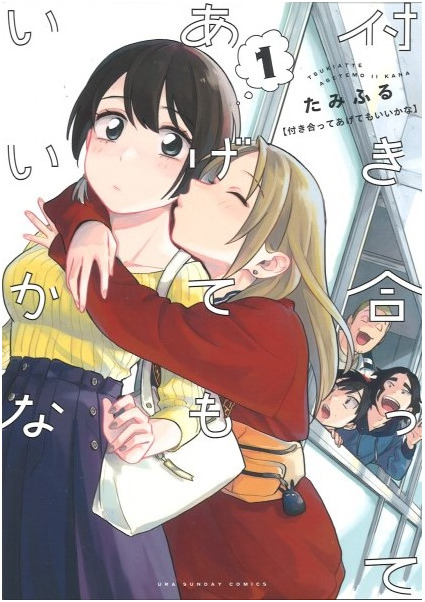
The story so far:
Soon after starting college, mild-mannered beauty Inuzuka Miwa joins the light music club and finds herself the center of attention from the boys at the welcoming party. Miwa, who "only likes girls", is rescued from the situation by the energetic Saeko. Saeko, who "prefers women (to men)", buoyed by liquid courage, asks Miwa out on the spot and the two begin dating. But the two are clumsy and inexperienced with love, and fail to be fully honest with each other. By the end of the year, their romance has ended in disaster. After maintaining a sex-only relationship for some time they return to being friends and even move on to new partners... Finally, as their respective relationships have both ended, the two look at each other anew, not as lovers, but as exes, and as absolute allies.
47: How Do We Relationship? has a very unusual structure. Shoujo manga tend to portray a dramatic path to the start of the relationship, but Miwa and Saeko begin dating at the very start of volume 1 and break up in volume 4. As we're now on volume 12, they've actually been exes longer than they were together.
Tamifull: Well, it has stretched a little longer than I expected (laughs), but the story is proceeding as planned from the start. I think rather than starting decisively with some sort of "All right, I'm falling in love now!" moment, real love tends to build up out of small things over time. I didn't want the relationships in How Do We Relationship? to start in this exaggerated, romance story kind of way.
47: And that helps with its sense of reality.
Tamifull: I don't believe dating and breaking up are things that we need to think about in such dramatic terms. It's easy to feel like every relationship has to be perfect, or that you need to have some sort of fated encounter, or that breaking up is a bad thing, something hopeless. Why shouldn't there be manga that throws away those stereotypes? Life is so much longer than a single relationship. It keeps going after you start dating someone, or break up with them. I think that's a message that I've consistently tried to tell with this manga.
47: Can you tell us how it got to be serialized?
Tamifull: It started out as a oneshot I did for Comitia (a doujin festival and marketplace in Tokyo) in 2017. Up until then, I had mainly been drawing yuri--manga about relationships between girls. And I wanted to tell a little bit of a different story at that event. Doujinshi are generally about 20 pages, so usually you introduce the main couple, have them confess, and wrap it up right around there. So I thought, what if they're already in a relationship and we watch them break up? I was basically thinking, "why not draw what I want to read!?"
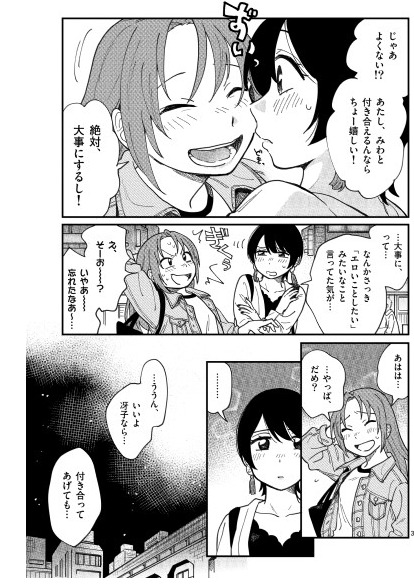
Watanabe: Ashima Yuki-san, one of the first freelance editors, reached out to Tamifull-san then.
47: At the time, yuri was considered a pretty small market. It felt like unless you got into one of the specialized publications you'd have a very hard time, right?
Tamifull: That's true. There are a lot more varied works coming out now. At the time most of these stories were actually aimed at men, so the relationships would stay platonic, or at most they might kiss. I knew stories like that were easier to market and less likely to ruffle feathers, but I found myself thinking, "If we all settle for that, we'll never get to see what happens next! If no one else is drawing it, why shouldn't I?"
47: What did Ashima-san say to you?
Tamifull: She told me, "I've been wanting to read a story where the characters and relationship feel free like this". I do remember thinking it might be more marketable without the eroticism when I was developing it for serialization (laughs). But I ended up just being like, well, let's see what happens!
47: "Realistic" LGBTQ romance stories tend to end up falling into a handful of patterns. Whether it's manga or movies, you see a lot of stories that feel like "the tragedy of same-sex love", or that seem intended to make you feel sorry for the characters. Like the audience is meant to walk away thinking, "How thought-provoking! I really learned something". But How Do We Relationship? is pretty different, isn't it?
Tamifull: Rather than being "yuri" or being viewed as an "LGBTQ story", I want people to get into the story just because they see it and go "Hey, there's girls dating in here!". Sexual minorities aren't here to be instructional materials for anyone. LGBTQ people live in the same world as everyone else. I want the characters to seem like people you might meet anywhere, and to have relationships you might see anywhere. I want the fact that the relationship isn't heterosexual to just be a detail. That's why Watanabe-san and I decided not to advertise How Do We Relationship? specifically as a yuri manga.
47: Achieving that sense of reality must take a lot of care. I imagine you have to be careful to avoid the set phrases and compositions that readers see all the time in romance manga.
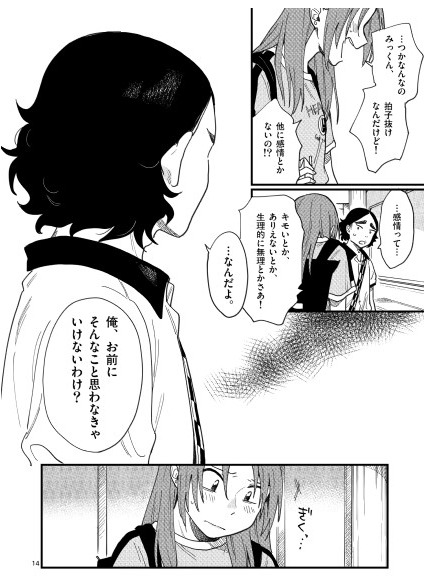
Tamifull: That's true. For example, in the scene where Saeko opens up to Mikkun, their male friend, about her dating Miwa, she asks him if he finds the two of them dating "gross, or wrong, or unnatural", and Mikkun, while looking away, asks in return, "What? Do I have to feel that way about you?". The orthodox move would be to have the handsome guy character looking straight out of the page, smoothly delivering some cool line. But in real life we don't have convenient handsome guys just lying around, and you're not usually looking people straight in the eye. It's not that staged. I think the casual nature of the lines, and the casual nature of the situation, actually make it all the more resonant. I want to keep that natural feeling to the story, and I go out of my way to avoid making it feel "romantic". I think my ideal is for it to feel like a movie.
47: A movie?
Tamifull: That's right. I think one of the strengths of film is the ability to show the drama of everyday life. I always include backgrounds in my panels to try to get closer to that feeling. For instance, in a scene in volume 12, Saeko is on a boat at night looking out over the water with her girlfriend, Yuria. They're talking about breaking up. It's a very romantic setting, but the painful nature of their conversation blots out everything except for the blackness of the water. I want readers to feel like they're there experiencing it alongside the characters.
47: I see. The city you see at night while breaking up with someone certainly does feel different...
Watanabe: And Tamifull-sensei's art has really helped deliver that sense of reality to readers. There are no wasted panels: from the camera placement to how the viewer's eye is led, even the placement of the dialogue, everything serves to guide the reader to what she's showing. Due to my job I read a lot of manga, but there are very few manga artists as skilled as her.
47: Personally, as a reader, it's that sense of reality that has me praying for Saeko and Miwa to end up happy, so next I'd like to ask a little about about how you learned to imbue your writing with such reality, and what techniques you use.
Tamifull: I'll do my best (laughs).
47: First, the depth and internality of your characters. For instance, after breaking up with Saeko, Miwa dates the younger Tamaki. Tamaki is reserved and very low-energy. She's clearly at a loss with the more sexually-motivated Miwa, but nonetheless does her best to reciprocate in her own way. She's straightforward and can be a little childish, but has an intellectual side to her, as well. Accurately portraying such a complex, difficult character must necessitate having an incredibly keen eye for people. How did you learn to understand other people so well?
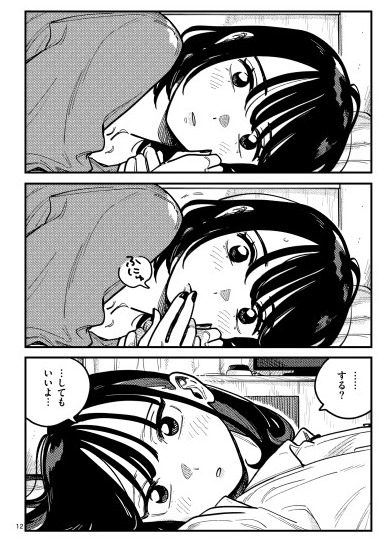
Tamifull: I think it was mostly my experience in school. In primary and middle school I was low on the pecking order, so I became very sensitive to other people's hostility.
47: Ah, the pecking order... That does happen, doesn't it.
Tamifull: Yes. I'd be in a group of maybe 5 or 6 friends in a class and then once every few months I'd get the silent treatment and end up being ostracized from the group, in this sort of rotation. I'd go through 2 or 3 groups and it would always happen. I think all the time I spent thinking about how to avoid being targeted like that played a big part.
47: Planning out the battle to make it out alive, so to speak.
Tamifull: I think that really helped cultivate my eye (laughs). Like, this girl's the ringleader, and these ones are joining in because they don't want to become the target themselves, but this other girl is actually nice so even when they're ganging up on me she won't join in.
47: I see. Even while you were being mistreated, you were trying to understand things from their perspective. Certainly How Do We Relationship? doesn't have any one character that you would really call a villain.
Tamifull: That's right. Take Kan, who tells Miwa "I hate you" in volume 2, or Tamaki's friend Nagi who calls her "gross" in volume 8. I think it would be too convenient if nobody was ever mean or unpleasant, so it's important to have such characters. But I also try to portray them as having their own reasons. It's not like everyone will be good to each other all the time, but for each person, there's a community out there somewhere that will accept them as themselves. I'm always including that idea, that wish, almost, as I write the various members of the music club.
47: The story has this warmth to it you can really feel, and I think that idea has a lot to do with it. That said, it sounds like you weren't always successful at avoiding bullying. That must have been difficult.
Tamifull: I spent a lot of time wrapped in my futon wondering, why do they treat me like that? As the days went by I'd end up sublimating my anger and frustration by telling myself, "They have their own problems so there's nothing I can do about it." Like, this girl might have a lot of stress at home, about her grades or other things, so she just feels too much pressure and gets pushed into bullying, or things like that. I really got in the habit of thinking about things from their perspective.
47: You are an incredibly kind person. I do think the eye you cultivated that way serves you well in writing characters. For example, in volume 3, we meet Miwa's first crush, Shiho. At home, we see Shiho being horribly mistreated by her parents, who only care for her more academically-minded younger sister, Maho. One day Maho snaps at her, saying "Don't talk back to me, moron! You know how much I have to carry thanks to your stupidity!?". But Shiho just accepts it, and keeps her unhappiness to herself. That's in volume 11, that we finally find out how Maho, who's caused Shiho so much pain, has been feeling.
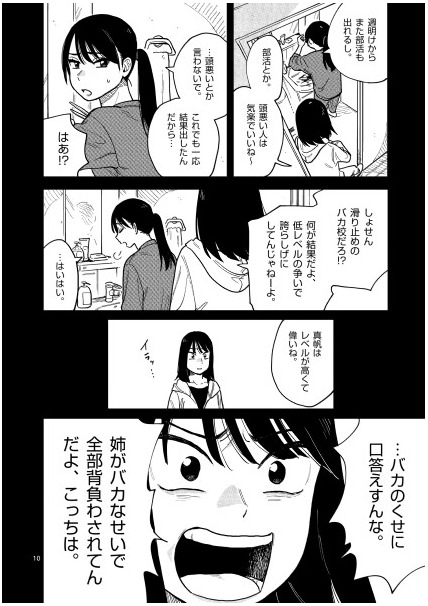
Tamifull: Maho also feels a lot of pressure from their parents, and she's desperate not to fail. She's under a lot of stress from that. When they were younger, Shiho and Maho were actually very close--Maho loved her older sister--but as grades and examinations started to get involved that connection became twisted... I wasn't able to show all of this in the story, but I always think through these details before drawing.
47: That sort of thing does happen between siblings, doesn't it... Just remembering is a little painful.
Tamifull: But, as much as I analyze people like this, it's very difficult to put into words.
47: In what way?
Tamifull: If you say "Well, this person has this kind of background, so that's why they do these things" then everyone will be like, "And what do you know about them?". You'll end up hurting feelings. So I can't say it about real people, but with How Do We Relationship? I'm the author so I can draw whatever I want. When I hear readers talk about the "realism" I'm always like, "Really? You mean I actually did it?". I secretly get a little happy about it (laughs).
47: Did you always want to become a mangaka, growing up?
Tamifull: I did always like drawing. But when I was pretty young I read one of those "So you want to draw manga?" kind of books and I got very intimidated by all the different erasers and tones and things, and I sort of gave up (laughs). It wasn't until I'd completely retired from extracurriculars in college that I realized I didn't have enough to do and started drawing manga.
47: And then you became a mangaka as soon as you graduated?
Tamifull: Yes, that's right.
47: That's quite something. Not many people manage to do that, right?
Tamifull: The reason I started attending Comitia was because in college I finally learned that editors would be there. Up until then I was working with my childhood knowledge--I thought I had to submit my work to a company and then become an assistant before I could become an author myself. When I found out I was like, "Doujinshi will get me fans and even expose me to editors? What could be better!?". I had my heart set on it.
47: (laughs). What kinds of things were you inspired by when you were a child?
Tamifull: All the way through school I was into stuff that was a little different from whatever was in fashion. I liked watching slightly older anime on Kids' Station, for instance. Like, look at me! I'm not into the same stuff as everybody else! Aren't I cool? (laughs).
47: (laughs).
Tamifull: When everyone else was into Cardcaptor Sakura, I was watching Takahashi Rumiko-sensei's Ranma 1/2 and Maison Ikkoku. I remember when I read one of Ito Junji-sensei's works at a relative's house it left a big impression on me. When I was in college I bought the collector's edition of Tomie at Village Vanguard.
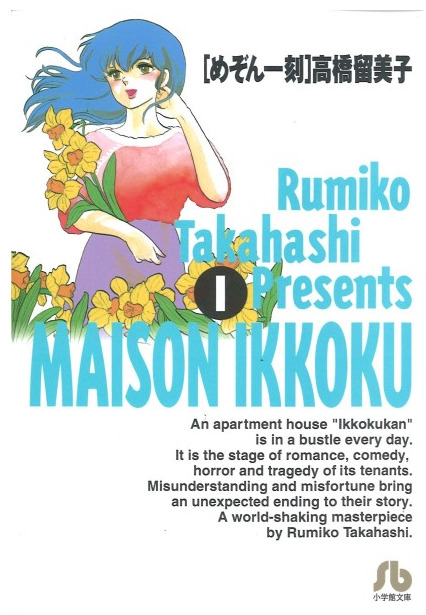
47: You grew up into a bit of an alt college student.
Tamifull: In college, going to Village Vanguard and fishing for manga nobody else had became something of a passion for me.
47: What about Takahashi Rumiko-sensei's work did you like in particular?
Tamifull: I especially liked the way she drew girls. In the early 2000s, when I was in primary school, it was very in fashion for girls to be drawn very slender and light, with delicate limbs.
47: Slenderness was certainly emphasized a lot back then, yes.
Tamifull: I preferred how Rumiko-sensei drew them--a little squishy. As far as the story goes, I loved the ending of Maison Ikkoku, how it portrays the characters moving forward in life. I read it over and over. I think that passion for people comes through a little in How Do We Relationship?.
47: In the afterword of volume 3, you mentioned that from middle school until about halfway through college you lost interest in manga, and were more into drama and music.
Tamifull: That's true. Sometimes I'd draw a buff Pikachu or something on the blackboard to try to get a laugh out of people, but that was about it.
47: A buff Pikachu? (laughs). I wish I could see it.
Tamifull: At co-ed schools I think girls mostly end up ranked by looks, but I went to an all-girls high school, so... It was really about who was the funniest.
47: So art was a way of giving yourself a gimmick.
Tamifull: That's right. That continued into college, so I always had the position of somebody who's just a little bit good at drawing. In college everyone was nice, though.
47: In that same afterword you mentioned that during the time you weren't drawing manga, you really enjoyed making things together with a group.
Tamifull: In high school I was in the school band, and we'd all put on plays together at school festivals. I joined the light music club in college. I did percussion in high school so I mostly played drums, or did vocals.
47: Oooh. What kinds of things did you play in the light music club?
Tamifull: Just normal rock. Popular stuff, like Go! Go! 7188.
47: I have an impression of you as being a little bit countercultural, so rock seems perfect for you (laughs).
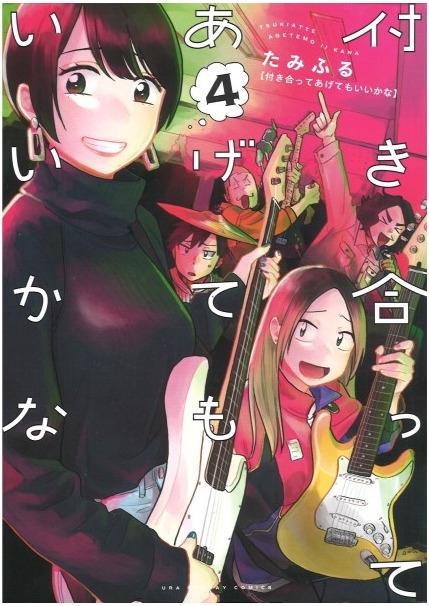
Tamifull: In college I was also on the student festival committee, so I was doing double duty a little bit. And as much as I enjoyed making things with other people, I started to feel this hole open up, like inside I'd be thinking "I could do this so much better...". Then I started looking into manga again on a whim and realized everything had gone digital. You don't need to hire a bunch of assistants, and you can do tones with the press of a button. It was like this new environment where I could try my hand at manga by myself was prepared just in time as I came of age. I didn't have to hold myself back for anyone, and could do everything just how I wanted. That's why I've always worked alone.
47: What!? You don't have any assistants even now?
Tamifull: I don't.
47: Watanabe-san, is that normal?
Watanabe: It's extremely precious to us. She's really something, isn't she? I don't know how she puts out so much in just two weeks.
Tamifull: I want every angle and composition just so. I can't really express it well, so when I think about trying to explain it to someone else, I just feel like it would end up taking even more time... But then sometimes I'll be working from my storyboards and I'll be like, "Why did I make myself draw it like this!?" and end up suffering a little (laughs).
47: It's certainly a work that cuts no corners. The dialogue is always so well written and moving--do you start by writing the characters' lines?
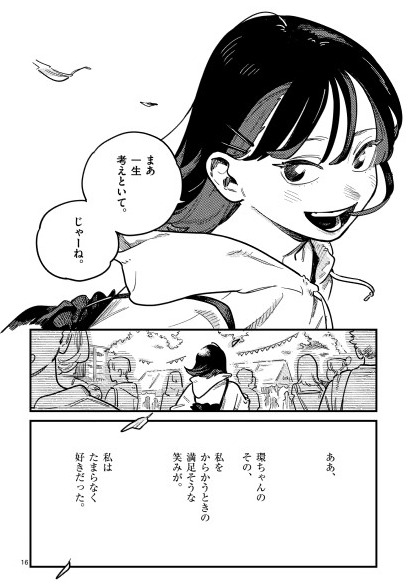
Tamifull: Yes, I do. I'll write them all out at once, then adapt them to the storyboards as I go. I think all the time I spent agonizing in my futon when I was younger like "I should've said this..." or "And then they'd say that..." might also help here.
47: You always include afterword comics and omake in the tankoubon releases, so I get a sense that you're quite particular about manga books.
Tamifull: I love manga that includes a lot of little extras. And I want readers to enjoy How Do We Relationship? as much as possible, so I always go all out drawing them.
47: Your first announced works were around 2012, and in 2014 you made your commercial debut with Don't Call me a Goddess! in Bungeisha's 4-koma magazine Manga Time. The main character, Saotome-san, is a bit of a tryhard, and as much as that wins her respect from her peers, it also tends to alienate them. Into her life barrels the far less inhibited Ryou. After that, you had My Little Sister and the Sex Doll (Shueisha) serialized in Tonari no Young Jump, about an innocent and naive high school girl and a talking sex doll. Both manga were comedies.
Tamifull: How Do We Relationship? was a little bit of a break in genre, yes (laughs). My Little Sister and the Sex Doll also started as something I made as a change of pace for Comitia (laughs).
47: It's a very rhythmical work--the talking sex doll's lines are incredibly well crafted.
Tamifull: The editors at Young Jump really liked it. It was a little more crude than what I usually write, so I did have some doubts... but they were very kind in offering me the serialization. I had to exercise my vocabulary to the fullest.
47: As much as it made me laugh, I could also somehow feel your desire to break taboos coming through.
Tamifull: That's true. I was trying to make fun of dirty comics, while making a dirty comic (laughs). Even when there would be the setup for some sort of fanservice scene, with something sexual happening to the girl, I would always interrupt it with a joke and turn it into something decidedly not fanservice.
47: On the other hand, something about the relationship between Saotome-san and Ryou in Don't Call Me a Goddess! feels like it connects to Miwa and Saeko. Are you particularly fond of that sort of relationship?
Tamifull: Honestly, that was... completely unintentional. I think, when it comes to protagonists, I do like a character who is quiet, but unexpectedly stubborn... When I think about my time in school, I had a lot of experiences where there would be another girl, and she'd have this sense of separation, like a bit of a boundary around herself, but when I approached her she'd turn out to actually be really interesting. And I'd have this feeling of "Everyone else doesn't even know how cool she is!? I need to let everyone know!". I think that feeling, almost like wanting to become a producer for girls like that, has led me to write my protagonists that way.
47: You really love girls.
Tamifull: I may have spent long years in fierce battle with them at school, but when I translate it to manga they become strangely appealing. Even when they're a pain, their being a pain is good in of itself (laughs). It's true that characters who aren't straightforward can make a story more interesting, but I also think that's just how people are--you can't sum anyone up in a few words. Don't you agree?
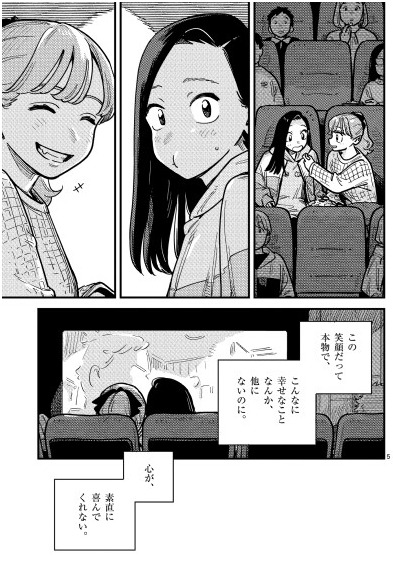
47: Your manga, including How Do We Relationship?, really don't tend to have characters that you can sum up as "the cool one" or "the tsundere" or anything like that.
Tamifull: That's right. I don't want them to be symbols.
47: And that's exactly why, in each case--Saeko and Miwa, Miwa and Tamaki, Saeko and Yuria--when they break up, it's so emotionally impactful. You can't just point at one of them and say, "It's her fault."
Tamifull: Right. In reality, lots of people break up all the time without either one really being at fault. It makes me really happy to hear that people read the story as just being how things ended up for them. It's so easy to assume that when a relationship falls apart, it's because someone's in the wrong. I worked very hard to make sure that Tamaki and Yuria would be charming enough characters for readers to like them, and to accept it when I made them break up with Miwa and Saeko. I always look at readers' reactions and think carefully about how to proceed.
47: How Do We Relationship? really feels like you want to closely examine real, "normal" relationships.
Tamifull: I think it's a pity for the socially accepted image of love to be something so narrow. When two women date, and after breaking up return to being friends, I think people have a tendency to look a little askance at them. But why is that? I always find myself thinking, "Are you okay with living like that?". With How Do We Relationship?, I wanted to create a world where Miwa and Saeko and everyone else's desires wouldn't be crushed by those around them.
47: Especially during the first 3 volumes, you often shine the spotlight on the other characters around Miwa and Saeko. Is that also a part of fleshing out that view of the world?
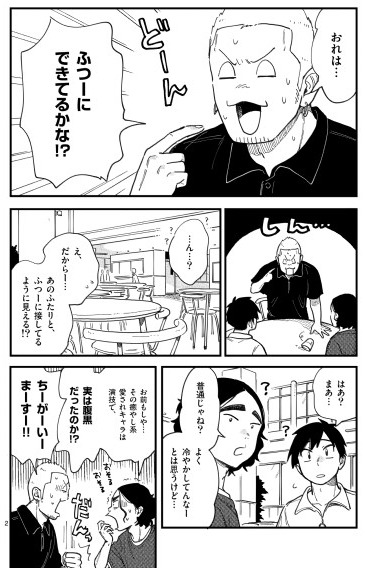
Tamifull: Something like that. I don't want the idea of someone who likes the same sex to be something fantastical. I want to show that sexual minorities are all around--even around you. I want heterosexual readers to also get into the story, and I was very conscious of that early on in the serialization. I think whether you're gay or straight, you can still understand this story. These characters are just like you. That's the message I've tried to send.
47: It would be really wonderful if we could become a society where everyone views each other with respect. What would that take, I wonder?
Tamifull: Delusions, maybe.
47: Delusions? (laughs).
Tamifull: Yes (laughs). This is just my own experience, but when I meet someone and feel off-put by them, I always thoroughly imagine their background. By the time I'm finished whatever anger I felt has faded, and I feel ready to treat them better--maybe even to become close with them. And if you write stories you can come up with great material this way, so it's two birds with one stone (laughs).
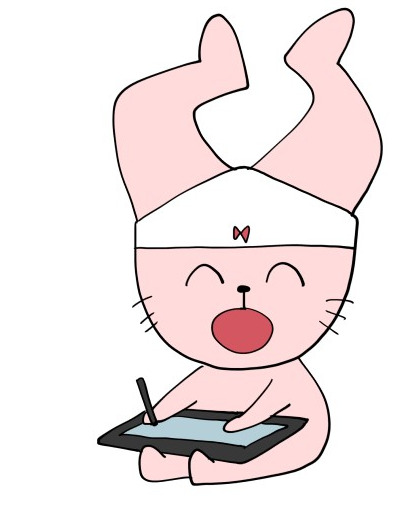
276 notes
·
View notes
Text
What Turned me Gay: The first BGeast match I purchased - Troy & Brian Baker v Vinny Trevino & Joshua Goodman (bgeast.com)
It's no secret that Bgeast turned me gay. The combination of hot men in compromising situations, muscles straining, humiliating holds; all summed up to ignite something inside of me.�� Now while all of that is worth a post in itself, I wanted to devote this time to rekindle a memory specifically about the first Bgeast match I watched, Tag Team Torture 3.
What turned me gay (not really) ...
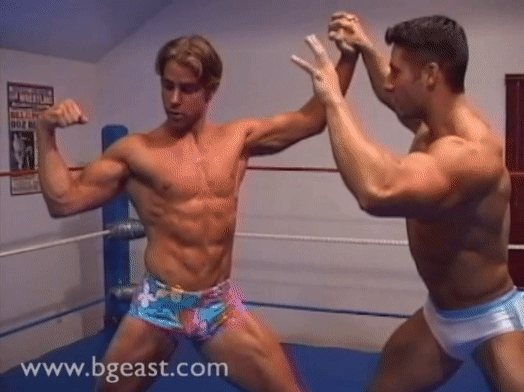
Troy & Brian Baker v Vinny Trevino & Joshua Goodman (bgeast.com)
This post, inspired by the sidelineland.com blog, takes a tongue and cheek look into "what made me gay (not really)" and in thinking about the topic of gay wrestling, it's helpful to go back to the beginning - at least my beginning as a gay wrestling fan.
The Background Now, when I first viewed Tag Team Torture 3, I had no idea what to expect. Sure I had watched porn before, but the default for porn back then (and now) was a cheesy few minutes of story line followed by emotionless hard core action. In those scenes the guys refused eye contact with each other, closed their eyes, and probably thought of their girlfriends or something while they did the deed so in a very big way, bgeast was different.
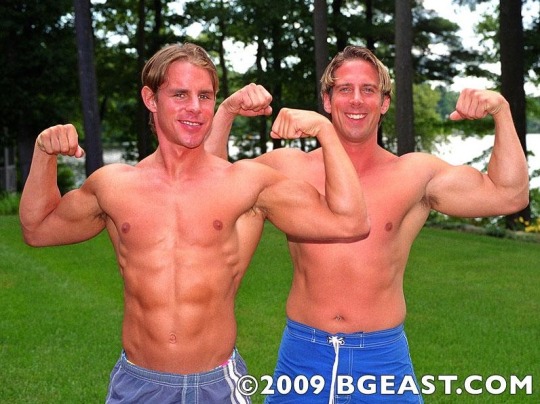
Baker and Baker - two reasons why I purchased this match. Beefier Brian and Tasty Troy.
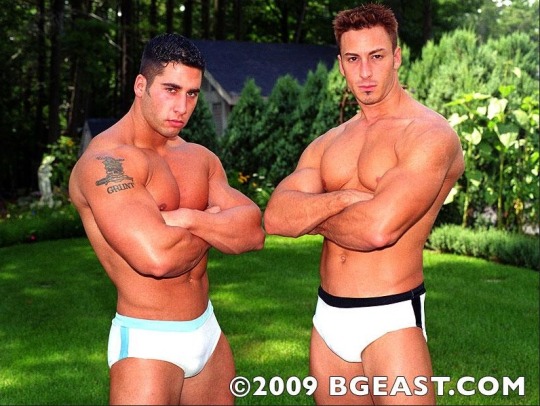
In hindsight, I love the Backstreet Boy Look on Mr. Joshua. This was a very popular look back then - Highlights and a Soul Patch.
And boy was Tag Team Torture 3 different, from the opening scene I realized that the focus was on the wrestling and everything, from the guys lifting weights, to the trash talk; all of this led up to struggle between men.

Troy and Brian bonding before the match. They build each other up saying stuff in the tone of 'you're the best, no you're the best'. They support and encourage each other ... at least for now.
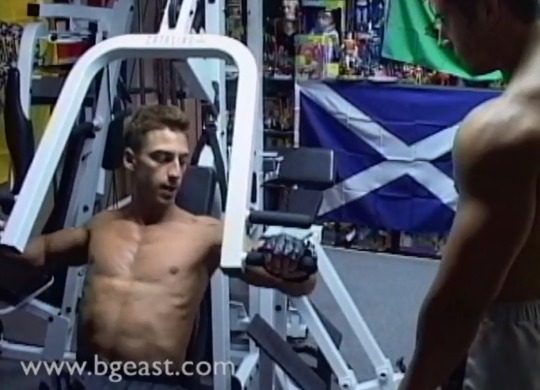
Compare that to the other team, bragging about how much they can bench or talking shit about their opponents the "beach boys". There's no building anyone up here, simply tearing the pretty boys down.
In lieu of porn which hurried to climax and rushed to "get the job done", gay wrestling highlighted the emotions exchanged between our guys and what is sex really except a bundle of intense emotions.
The Action Finally, 20 minutes in the guys start to wrestle. I told you that gay wrestling takes it's time and slowly savors each and every popping bicep and ab and now we have the Troy Baker reveal and boy was it worth the wait...
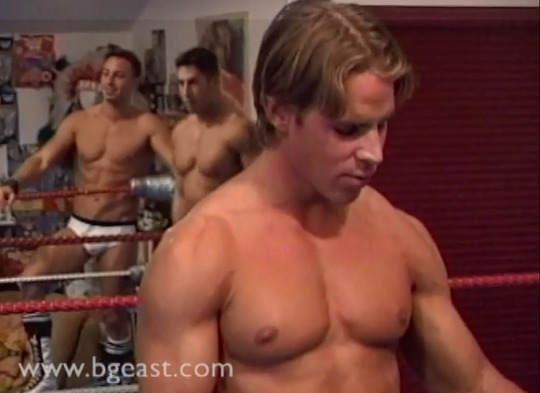
Troy knows what we're all here for.
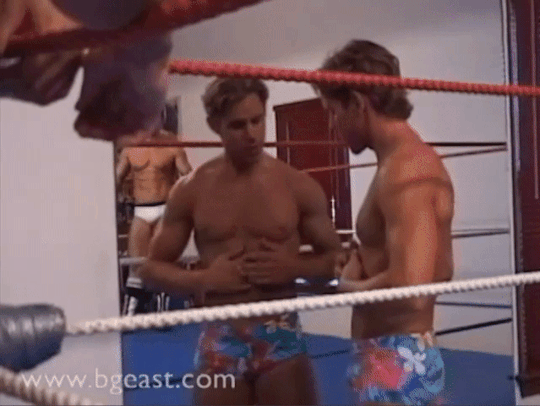
And later, Troy swooning over himself. The man and I are on the same wave length when it comes to admiring that body.
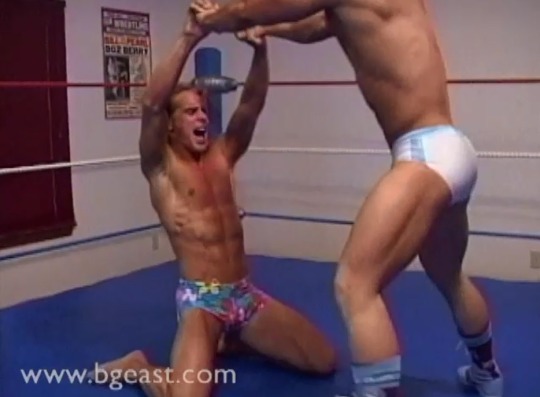
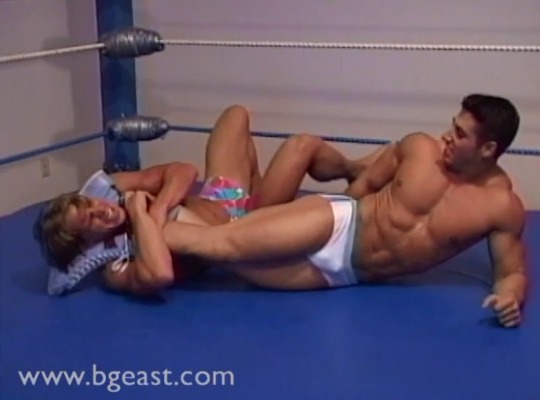
But all that muscle just begs to be abused.
Brian Baker is the powerhouse but he can't fight off two men by himself and it's clear that Troy is more interested in himself than on the match.
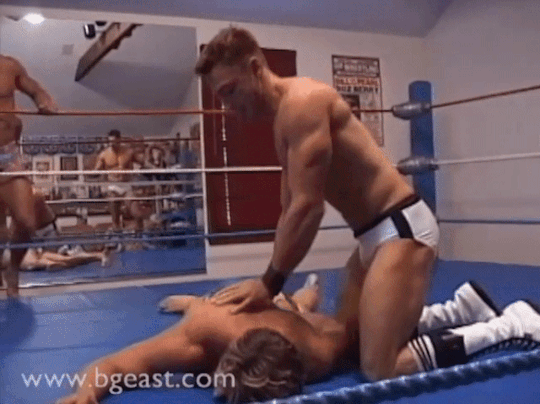
Mr. Joshua multitasking by dominating and making his infamous "adjustment". I love how the back of his hand goes straight from his package to smacking Brian on the back of his head.
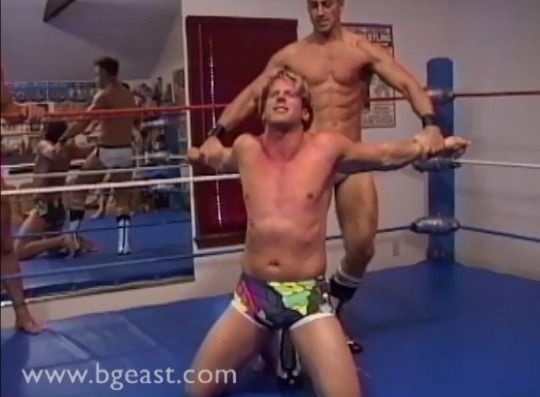
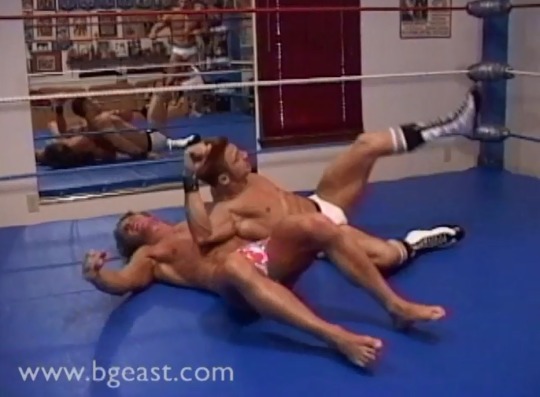
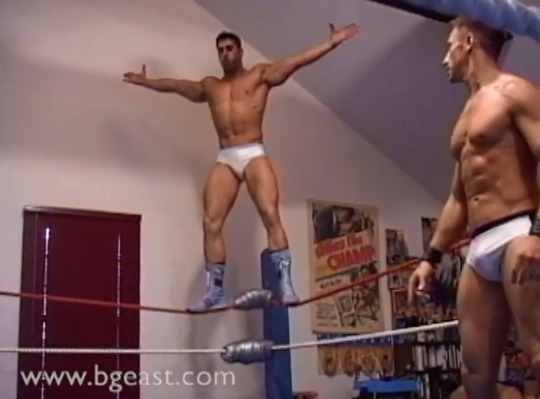
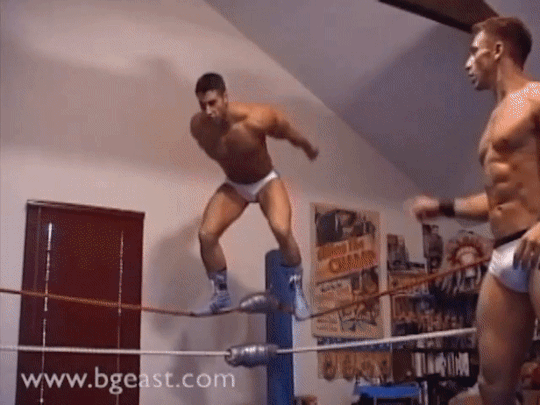
Brian: [exasperated]: Lookout Troy!
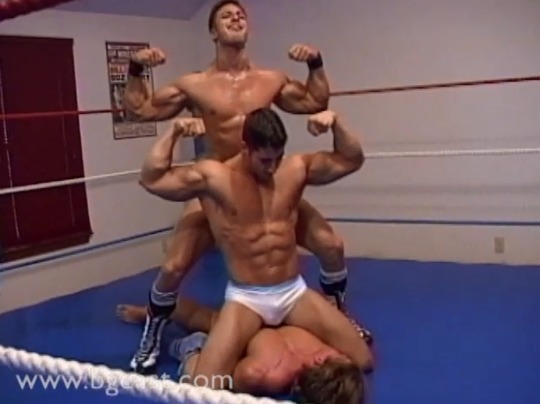
Vinny: You like that surfer boy? Troy: *Moan*
The Finale At this point our heroes are done for. All that camaraderie, the hours at the gym spent sculpting those muscles, all of that vanishes and we are left with a beaten Troy Baker.
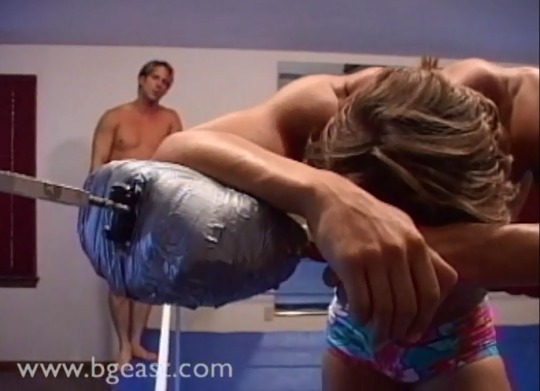
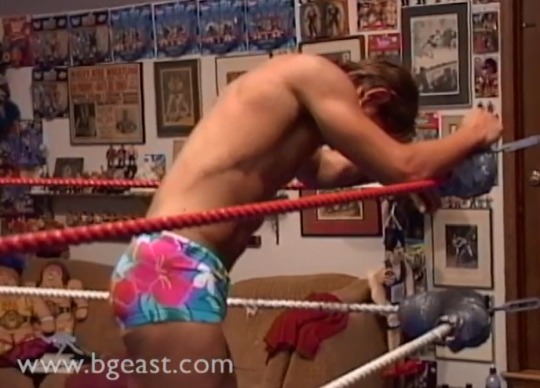
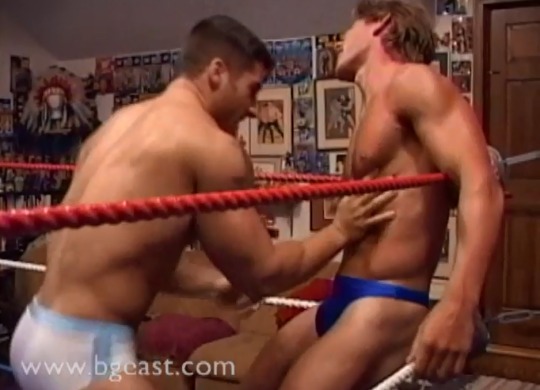
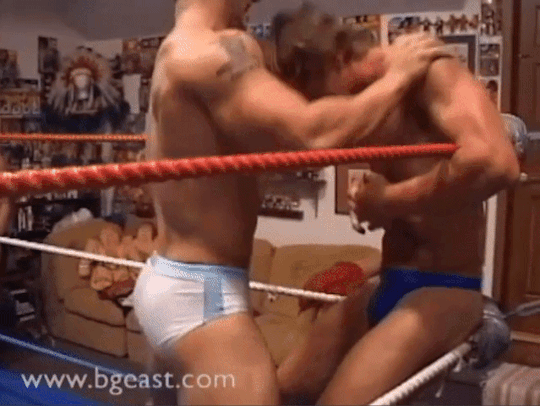
To further the point, our heels double team the helpless Troy while his brother watches on. Further emphasizing that there is no coming back from this one.
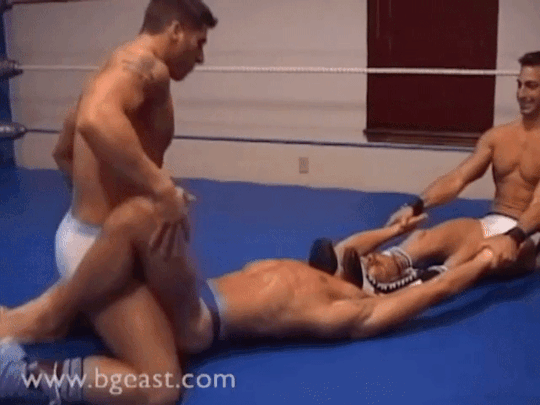
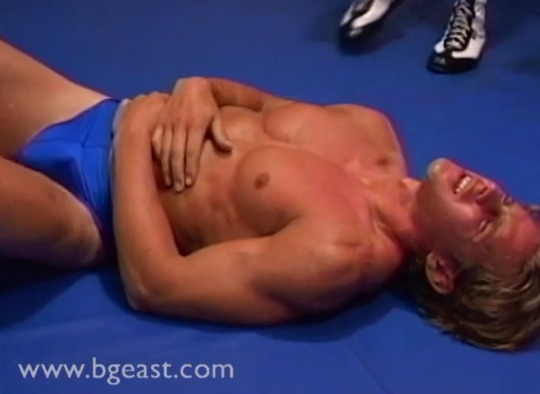
Troy's abs of steel are put to the test with yet another barrage of abuse. That golden tan is starting to turn a shade of pink as even those abs of steel have their limits.
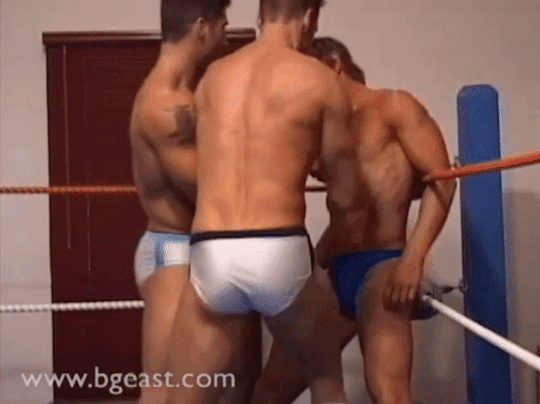
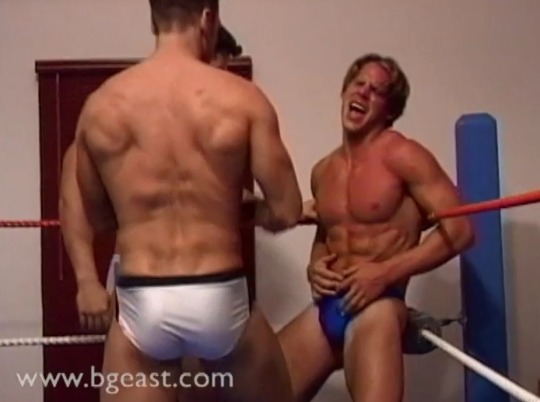
But the real crescendo for this match comes at the end. When Brian seems to triumph despite the odds and an upset looks possible, that is until a weakened Troy folds under our heels. It's that moment followed by a betrayal when our gay wrestling saga is complete and the Baker Brothers are finally broken with sound and fury.
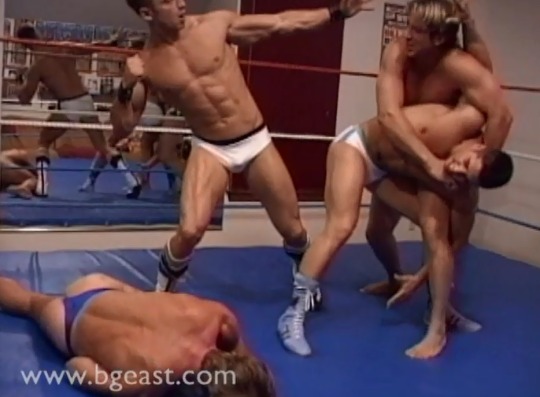
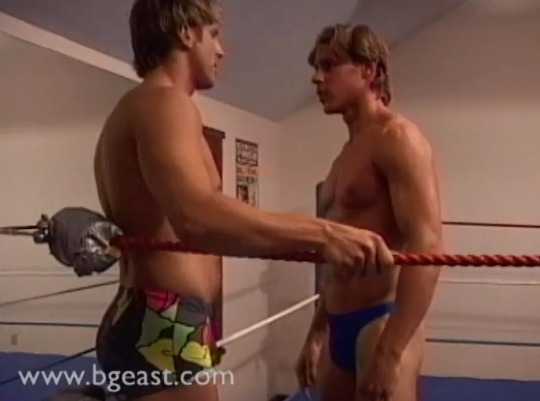

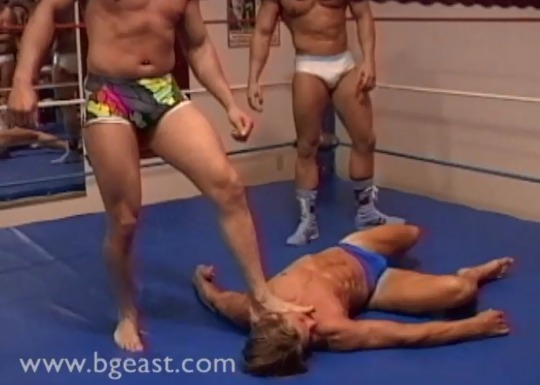
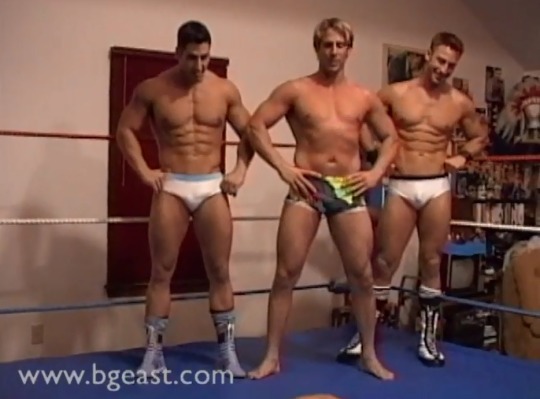
In hindsight it's obvious to see why gay wrestling sucked me in and became my obsession. I've always loved the emotional highs when I wrestled in high school and bgeast perfectly captured those stories of struggle and dominance multiplied by like 1,000. You see this story, told through sweat and humiliation is so vivid, so real, that the feelings I get now from watching a 20 year old tag team match are the same as when I first saw them and is undoubtedly what turned me gay (not really).

159 notes
·
View notes
Text
Endless Desire

Nicholas Ruffilo - One-shot +18
Synopsis: After months apart, Nicholas and his girlfriend finally reunite, bringing with them a hunger for intimacy that's been simmering for too long. The girl, determined to give Nick an unforgettable experience, has a plan that pushes both of their boundaries. With careful control and intense teasing, she leads him through an experience of pleasure and restraint that builds up to an explosive release. But as they explore new levels of trust and vulnerability, they realize their connection runs deeper than desire alone.
Content Warnings: This story is fictional and contains explicit adult content, including themes of orgasm denial, power dynamics, and light BDSM. Recommended for mature readers only. Please read with discretion and be mindful of your boundaries.
Nicholas kissed his girlfriend without hesitation. It had been three long months away from her, sleeping on a bus packed with his bandmates. No sex, just silent moments of solitary relief. He missed the intimacy, the feeling of being with her.
The girl knew how much Nick needed her at that moment, but she'd had a plan in mind ever since he started the tour. She wanted to give him an experience he'd never forget and decided to try orgasm denial. The promise was that, by the end, after so much restraint, he'd have the best climax of his life — and that was exactly what she wanted.
Breaking the kiss, the girl gently laid Nicholas down on the expansive white bed.
"I want to try something with you, but you need to cooperate," she said.
"We can try later. I want you now," he replied, reaching for her.
"No, babe, I've been planning this for months. It's going to be good for you. All you have to do is hold out as long as you can, and I'll take care of the rest."
The girlfriend took a bottle of lubricant from the drawer and asked him to undress.
The sight of Ruffilo lying on the bed, his tattoos even more prominent, left her in a state of pure excitement. She sat beside him, locking her gaze onto his.
"We have a few rules. First: you're not allowed to touch yourself or me. I'm not going to tie you up or restrain you, so this will take all your self-control and focus. Second: I decide when we're done; your only job is to endure."
"Alright," Nick replied, unable to hide his smile.
The girl opened the lube and applied it to his already semi-hard length. The cool sensation against his warmth made him shift on the bed, clutching the sheets in his hands. She moved her index finger slowly along his shaft, spreading the lube evenly. Using her fingertips, she massaged the tip, making him shiver and let out a soft moan. Finally, she wrapped her hand around him, moving up and down in slow, deliberate strokes, picking up speed with each of his reactions.
Nick watched her with his mouth slightly open. His girlfriend had touched him before, but never with such care, as if she was paying attention to every inch of him. Her hands didn't settle just on his shaft; they moved lower, massaging his balls, which seemed to weigh a ton. Gradually, she increased the pace, pulling deeper moans and gasps from him.
"I'm almost there, don't stop, please, this feels so good," he whispered.
Just when the girl sensed he was nearing the edge, she stopped, pulling her hand away. Nick looked at her, a mix of frustration and confusion in his eyes as she gazed back at him with a victorious smile.
"When you're ready to hold out a bit longer, let me know, and we'll continue," she said calmly.
"What the hell are you doing?" he asked, half-laughing, half-breathless.
"Relax. The ending's going to be worth it."
His girlfriend leaned down, placing her hands on his thighs, and blew softly on his lube-slicked length. Nicholas shivered, taking a deep breath to calm the storm raging inside him. Less than a minute later, still gripping the sheets, he nodded.
"You can keep going."
She applied more lube, carefully spreading it along the length and even lower, down to his perineum. Ruffilo closed his eyes, tilting his head back as her touch ventured to a place no one had explored before. Soon, her fingers traveled back up, massaging his now heavier, swollen balls.
He just wanted the discomfort to shift into pleasure; he craved release. But the girl wasn't in a rush, which turned the experience into the most torturous pleasure he'd ever known. Once more, just before he could beg, she stopped. She grabbed a pillow and handed it to him.
"Put this behind your back and hold onto it for support. Keep your hips up for me," she instructed, positioning herself between his legs. With the pillow beneath him, Nick's hips were elevated slightly, giving her better access.
The girl resumed her touch, this time using her other hand to stroke his thigh. While one hand moved rhythmically up and down his throbbing length, the other traveled along his thigh, before joining in to add to the sensation.
Nick's eyes fluttered closed, his mind hazy, and he felt every ounce of blood in his body pooling in one place. He let his head fall back, releasing a desperate moan. Her victorious smile widened as she felt her own excitement building. She had never felt so powerful.
Slowly, she brought one hand down again to his perineum and beyond, cautiously stimulating the entrance that had never been touched before. Nicholas lifted his head, watching her with wide eyes and labored breathing.
She leaned forward, licking his chest and finally pressing her lips to his. His long hair stuck to his forehead and neck. Sensing he'd endured enough, she decided it was time to let him have his reward.
Gripping his shaft with both hands, the girl sped up her movements. Her rapid strokes elicited sounds from him that barely made sense. His eyes half-closed, his breathing ragged, Nick finally tensed and released, an orgasm that seemed endless. She didn't stop until she had drained every last drop from him.
Nick removed the pillow from his back and collapsed onto the bed, feeling the tension in his body melt away. He couldn't stop smiling, utterly content.
"Wow, that was... wow!" he gasped.
His girlfriend lay beside him, gently running her fingers through his hair.
"I wanted you to have the best orgasm of your life. Was it good?"
"The best, hands down! But I didn't do anything for you."
"We'll have time for that later."
"Maybe I'll return the favor next time."
She laughed, already hopeful.
"I love that your own satisfaction is never enough."
"I like seeing you in control, but I also like seeing you let go."
"Speaking of letting go... think you'd ever let me go a little further? I have to admit, I was tempted."
"Further?" Nick looked at her, confused, as she gave him a shy smile. "Further down there? Hm, I think I'll need to get more used to the idea first."
"They say anal stimulation's amazing. If you agree, I'd love to try."
Nick's eyes gleamed as he leaned his head back with a grin.
"You're going to drive me crazy."
"That's the spirit. Now let's rest — I want you recharged for later."
49 notes
·
View notes
Text
alright so i've just spent most of the morning catching up with nb s3 so here are my thoughts immediately in retrospect (spoilers of course)
it became very clear with the last few lessons that the writers either were on crunch time to round things up (most likely) or just could not give a shit (feels less likely, and i want to have more faith than that in them)
so i guess we're never going to find out what nightbringer's deal was? or what he meant by sending mc back in time to find happiness?
or what that prophecy was about
or how nightbringer 'made solomon the man he is'
or why barbatos was so mysteriously knowing in the opening movie, as if he had something to do with the time thing
or what the deal is with michael
story ended before we could date thirteen :(
not really to do with s3 but i wonder if they ever intended to have mc make pacts with diavolo or barbatos
thirteen and mephistopheles did not have arcs at all? there were some points where it felt like thirteen was deliberately excluded, even
raphael's arc is over so abruptly as well. he's anguished and distraught and then babel explodes but not really and he's completely fine again afterwards?
did not need lucifer to be in angel form for the master moment. and i feel like it would've hit harder for lucifer as a demon to break through the illusion anyway!!
it felt like there were so many cop-outs in general
rule of three: mc does fall from things three times in total but there doesn't seem to have been any real narrative reason for that
the last fall had a whole dramatic foreshadowing dream about it! but mc just has a brief vision and then it turns out lucifer caught them and everyone's fine
got real tired of the angel stuff.. the celestial realm's done a complete 360 in terms of its perception in the narrative and i'm really not a fan of it
simeon just. decides to keep being an angel. and it works??????
well it immediately turns him back to human apparently anyway
and the implication at the end is that he's just going to go back to being an angel, too, which... COME ON
i audibly went "oh ffs" at that part
i wasn't that mad at them just reversing the demon-simeon thing because i think the most interesting way to explore his character was to keep him human
then they kept going and i was like GUYS NO WAIT
the magical science is really frustrating because it's just close enough to real life science but a bit too hand-wavey about the magical mechanics to be interesting
beel gets done incredibly dirty in general - it felt like the majority his dialogue just continued to boil down to "i want food"
barbatos has basically nothing to do, which is crazy given the nature of nightbringer and his... you know... time powers
i really do not buy mc being totally fine after all of their exploits. surely there must be SOME physical repercussions even if they're so powerful?
the implication that the brothers are eventually going to figure out the time travel thing (and that diavolo already knows) interests me, but of course now we'll never know
the unwillingness to bring up any real conflict around mc's increasing power was really frustrating in general - couldn't the 'it does that to defend out of a manifestation of their kindness' thing have come after they genuinely struggled with it for a bit?
couldn't anyone have debated what they might have to do if mc became a danger to the devildom? because that angst could've been great
mc's magic in general isn't really handled well
the moon plot in lesson 60 felt like it was intended to be the big climax of s4, which was then hastily repurposed into the s3 finale when it was announced that the story wouldn't continue past there - it felt similar in vibe to the three-world-imbalance plotline of om s2, something that really needed a lot more time for both the build-up and fall-out
for a hot second i was convinced this was gonna be an atla 'my lover turned into the moon :/' thing but of course not
the premise of the moon plot was really good though! i can imagine a better planned season, with writers who actually had time, that could have done it really well!
the idea of 'the moon is in love with mc too' was a really funny plot point (/positive), kind of loved it
i genuinely didn't realise that the moon plot had been resolved until diavolo started making his science fair speech. i thought it had failed because mc and [demon brother] got blown up or something, and they'd have to try again
so for a good while i was just going "guys?? guys the moon? it's still coming? the big moon? it's gonna kill everyone ??"
i got excited by the chapter name 'the sleeping demon' because i thought the king was going to get involved, but it's just whichever brother you picked passing the fuck out after the moon explodes
there's a lot more routes in lesson 60 - almost certainly because they had to get in an obligatory end-of-season kiss with all the romanceables and couldn't fit them all
the generic references to 'he' and the lack of any dialogue from the other brothers during 'the sleeping demon' made it feel really stilted and awkward - i suppose they didn't have enough time to really tailor the dialogue to each brother, which is fair enough, but also the plot point of the brother passing out didn't feel necessary in the first place
if they needed a branching point to pick a brother for their obligatory kiss, they could've just had mc get moon blasted and then they can choose which brother is there when they wake up
they'd need a different plot point for the others after that, but it gets rid of the awkward references to a nameless 'he'
the thing that puzzles me is that seasons usually wrap up their big plots by the end anyway, but the pacing of the end of s3 feels like they were expecting to end at, like, lesson 70 instead - my best guess is that a pre-existing lesson 60 had to be modified to feel suitably end-game (brings me back to the idea that the moon plot was meant for a future season)
also i don't purport to know what's going on behind the scenes but at times it felt like they could have spent maybe ten more minutes adding a little more dialogue (the bonus story in lesson 60 comes to mind)
all in all... it's a weird place to end the story on. i probably still need to gather my actual feelings regarding that but right now i'm just kinda like "okay. huh. well nice knowing you guys i guess"
24 notes
·
View notes
Text
ARCANE SPOILERS
sorry this is about to be longwinded asf but is anyone else kinda disappointed with the last arc. this is mostly gonna be about vi and jinx although i think them teasing sevika stuff but her showing up like twice and not saying shit was also weird. from the start i didn't like caitvi on like a yay shipping level but i didn't mind them that much. the lesbian situationship bit in the first two acts of season 2 were funny, i actually enjoyed it cause hey girl i've def been there before, but the third act is where i really begin having issues. at the start of the season vi becomes a cop. i know she is one in league but with the story in arcane it feels a little bit of an odd choice but i digress, its coming off like she once again is shouldering the blame for jinx. she is vi's problem. she is trying to fix things. obviously this doesn't work, cait starts changing, there is the whole isha protecting jinx moment (isha's character in gen), vi crashes out. the build up so far feels like vi and jinx are going to reconcile at least somewhat to have an understanding of each other, the crashout for vi aiding in this with vi completely changing and then starting to have an understanding of her sister. the vander and isha moment in ep 6 was what i thought to be the climax for this. then act three starts. we're in a different universe where vi is dead but everyone lives in the memory of her. jinx has a huge memorial and pink in her hair, vander has a vi tattoo, ekko paints the mural. we go back to our universe and vi is rightfully yelling at cait not mincing her words at all, sure cait explains herself but never once has she shown any change with her actual actions. Vi learns jinx turned herself in and later when she goes down to find jinx she sees her suicidal and depressed. when jinx tricks her and escapes locking vi in why, after cait gets vi out, does vi not go running after jinx? why does she proceed to have sex with cait randomly in the jail cell her sister was in???? the line of jinx "supporting" caitvi felt like she was bitter and added to her depressed state. remember she became jealous that vi showed up with cait in s1?? that should've been ekko AND vi saving jinx later on. whats the point of jinx coming back with a haircut JUST like vi's and with pink in her hair for barely anything. what was the point of any of this. it does an incredible disservice to vi and jinx as characters and their entire relationship. its weird after all this vi would go back to cait. the final line for them comes off soo unbelievably laughably classist after everything i legit have no words for that shit. "i am the dirt under your nails cupcake nothings gonna clean me out" to the upper class person whose family was gassing zaun and who knows what else historically we as the audience don't know. i simply just do not think a character that is supposed to be embodying the hardships of the zaun would do all that.
#arcane#arcane spoilers#arcane season 2 spoilers#arcane act three#arcane act 3 spoilers#arcane act iii#vi arcane#jinx arcane#jinx#vi#vi and jinx#caitvi#text
32 notes
·
View notes
Note
how do you build up the tension between two characters without dragging it out or jumping the gun by rushing it?
This is a great question! I mostly write romance/romcoms so I'm going to answer this about building romantic tension, but I'm guessing it works for other kinds as well.
As always, please feel free to reblog or comment with your thoughts, suggestions, disagreements!
The first thing that comes to mind for me is to think about all of the ways they're going to show their progression into the romance--their relationship milestones--and make sure they're spread out in a way that feels balanced and good.
In a romance, the things you're aiming for as relationship milestones will vary depending on what type of book you're writing. If it's a steamy enemies to lovers story, the sex will start pretty early into the book, so the will-they-or-won't-they isn't about sex, it's about feelings. The big milestones in that case might be things like
admitting attraction
hooking up
sex
first feelings of romance (you shove them under a rug)
first feelings of romance (you admit to yourself you have them)
first time testing out if they like you as more than an sex partner
first time admitting you liiiiike them
first time them admitting they liiiiike you
love confession/happily ever after
On the flip side, a slow burn friends to lovers (no steam), it may be things like
noticing she's pretty
touching hands by accident on the bus
touching hands ON PURPOSE on the bus
lingering stares
staying up all night talking
picking her up from a date with someone else and being so sad
trying to date someone else
spending the night together AS FRIENDS
erotic hair braiding
happily ever after
Once you think through what some of those milestones will be for your story and your characters, then you can figure out how you want to spread those out throughout your story. Tension comes in the spaces between those milestones and in yearning for the next one, so you need to give space for each milestone to (a) be exciting! (b) be celebrated (or feared or repressed or whatever) and (c) get old enough that we're pining for the next one. That's why you go from touching hands by accident to being brave and terrified and anxious when you decide to do it on purpose.
With the right build up--the pining for the feel of her smooth skin against yours, the noticing how her hands look, day dreaming about her fingers, picturing yourself touching her hand a million times, barely breathing--finally touching her hand on the bus can be as emotionally resonant as sex or a love confession.
consider each milestone as a small emotional climax (sex jokes are welcome and frankly appropriate), and treat it in the way you'd treat the big story climax.
The other thing I'm thinking about is the disconnect between what they say/show and what they think. In my debut novel, the first time Alice sees Van, her inner monologue is immediately like OMG GIRL HOT!!!! THIS BUTCH IS STUNNING AND SMELLS SO GOOD I WANT HER TO TOUCH MEEEEEEEEE. What she actually says out loud is more along the lines of "hi, nice to meet you, i'm your brother's formerly secret girlfriend."
That creates tension because the reader then (hopefully!) thinks, oh wow, how long can Alice keep it together when she's such a bisexual disaster? How long can she go without revealing how badly she wants Van to jump her?
Here's a little map of our milestones and interior/exterior:
first meeting. Alice thinks: GIRL HOT. Alice says: hi i am dating your brother??
first flirt. Alice thinks: if she touches me i'm going to fucking lose it (complementary). Alice says: thanks for the ride home, your dog is cute.
first admit you like each other. Alice thinks: i want to never leave her house or her presence. Alice says: you should be really proud of the life you've built here.
first cuddle. Alice thinks: i'm going to die. i'm actually, physically going to die under this snuggie. this girl is so hot and kind and i'm obsessed with her oh my GOD. Alice says: your mom seems nice.
Those are kind of silly examples, but I hope it helps to be able to see that we're waiting for her inner monologue to match her actions, and the stakes for both get higher and higher as they move through the milestones until the moment when she (a) says what she's thinking, and (b) gets what she wants. Aka, HAPPILY EVER AFTER, BABY.
thoughts, feedback, other suggestions, questions? bring them!
#writing advice#writing fiction#writing romance#writers on tumblr#writing#writers#fiction#romance#romance novels#romcom novels#writing romcoms
53 notes
·
View notes
Text
I'm rereading Matthew Swift, and getting close to the end of The Midnight Mayor. And the further into it I get the more I realize that this book is not only my favorite, but the book that defined the series for me.
A Madness of Angels is a great introduction. We meet Matthew, we meet the angels, we meet London, we're immersed in Kate Griffin's glorious prose and the magic of the city. We get the answers to Matthew's questions--"Who killed me, and who brought us back?" We get the climax, the confrontation of the past. Madness of Angels is the origin story.
Midnight Mayor, though, is the thesis statement. Rereading it, knowing what's coming, I am reveling in how the entirety of this book is setting up its perfect final declaration. Every little thing it chooses to dwell on, for what seems like no particular reason. Strangers. The stones of the city. Give me back my hat. The work of all the millions of invisible people who make the city run, bring in the food to feed it, take the trash away. The Aldermen, their philosophy, that speech Mr. Earle gives about a city of ants, all of them following blindly, nothing binding them together but the structure of the city, and of course the Aldermen are the only ones who see it--how very Plato of him! The only one who can see the real world casting its shadows on the wall (ha) of the cave, how enlightened, of course he should be in charge, at least according to him.
(Can you see me slipping into Kate Griffin's writing style? I love the rhythm of it. It's rubbing off on me.)
Every part of this story is slowly building up evidence, refuting counterarguments, preparing us for the thesis at the end of the book. Matthew tells us life is magic, sorcery is a point of view, and in Midnight Mayor we get to see what that point of view is. And more than that--we're invited to join in it ourselves.
When I say that the Matthew Swift books are bursting with love for humanity, what I'm talking about is how one act of kindness, from a stranger, saves the city of London from mythical destruction. How the Aldermen look at the city and see ants, interchangeable and insignificant, and Matthew looks at the city and says no, every single one of those is a human with thoughts and dreams and buses to catch, and every single one of them matters. No such thing as strangers. No one is alone.
Every time I read this book, I think, this is how I want to look at the world.
#this ran away from me a little bit#cutting it off there so i don't write another thousand words of prosetry#in addition to giving us a glimpse at the magic of the city i also appreciate kate griffin for giving me an excuse to use SO many commas#but i do need to stop somewhere#stars has thoughts#matthew swift#the midnight mayor#stars meta#i was trying so hard to write this in a way that doesn't spoil the actual plot#im still trying to bait all my friends into reading this series#do it it's so good
37 notes
·
View notes
Text
Short Reflection: My Hero Academia Season 7
It's so hard for me to wrap my head around the fact that My Hero Academia is ending.
For context, MHA is maybe the third anime I ever watched. Not counting Spirited Away and a few seasons of Pokemon, I was first introduced to anime through Attack on Titan, then decided to explore the medium more fully after falling in love with Fullmetal Alchemist Brotherhood. And the next show I decided to check out after that was, of course, this silly little superhero show that only had two seasons out at the time. So it's safe to say that My Hero Academia was one of my formative experiences as an anime fan, one of those shows that defined for me what this medium was capable of and why it was worth devoting so much of my life to. I fell in love with its charming characters, its pulse-pounding action, its deeply earnest portrayal of heroism that wasn't ashamed to be corny and heartfelt. And in the seven years since, I've continued to find new reasons to love it, even as my taste has evolved and my understanding of anime has deepened. As much as I've changed, one thing remains indisputably true: My Hero Academia is a show I'm always excited to return to.
But seven years is a long time, and the anime industry of today feels worlds away from when this show started. Smash hits like Demon Slayer and Jujutsu Kaisen have rewritten how shonen anime gets made and how fans engage with it. There's more anime being made than ever, but it's all spread so thin almost none of it gets the resources it needs to be the best version of itself. And somewhere along the line, it feels like My Hero Academia slipped through the cracks. What use does this earnest, sentimental show have in today's more jaded landscape? What use does the world of today have for heroes anymore? In a way, it's like our world has started to mirror the world of the show itself: paranoid, cynical, distrustful of the very concept of heroes that once drew us to it as surely as Deku and his classmates were drawn to All Might's seemingly eternal silhouette. And now we're staring down the end of the anime that once stood at the forefront of mainstream appeal, left to wonder what remains when the dust finally settles.
And what remains, it turns out, is one of the best goddamn anime I've ever had the pleasure of watching.
There's just no getting around it: My Hero Academia fucking rules. From start to finish, from 2016 to now, it's remained one of the most consistently entertaining, emotional, and thoughtful series to ever spring from Shonen Jump's pages. A story that effortlessly merges heartfelt sentimentality with complex moral quandaries, that deconstructs its own premise to reach the beating heart of heroism itself, that isn't afraid to call for massive, society-reshaping change if that's what's necessary to right the wrongs of our current system. And it delivers those themes through deeply rewarding personal journeys for almost all of its characters, no matter how small, and a series of no-holds-barred superhero showdowns that will have you punching the air one second and screaming in panic the next. My Hero Academia is excellent. It's always been excellent. And as it barrels headfirst into its final stretch, it's never been more obvious just how spectacularly it's going to stick the landing.
It's tricky to talk about Season 7 in isolation because unlike most seasons of MHA, it doesn't stop comfortably at the end of an arc. This is, after all, the final battle, the final showdown against One For All, the League of Villains, all their myriad supporters, and the failures of hero society itself made manifest in the lost souls they've let slip through the cracks. And with how massive the cast has grown, it's inevitably going to be a massive, sprawling affair with far too many moving pieces to comfortably wrap up in the space of a single season. So after a brief stretch of build-up to set the stakes, this season is all about climax, countless skirmishes between countless characters as UA enacts its final plan to take down OFA and rebuild their world into something better. It's all gas no brakes as plot threads from all throughout this series come crashing and tangling together, finding closure for every step of the journey we've taken to get here in the most suitably explosive and cathartic ways imaginable. And even then it only has enough time to get us to the start of the final final battle before saying "see you later" for one last season next year. But we've waited this long for the grand finale, we can wait a little more. I'll take an appetizer this fantastic en route to the main course any day.
So in essence, this season is all about taking MHA's sprawling narrative and whittling it down to its core one step at a time. And I think it's worth taking a second to acknowledge what an insane challenge Horikoshi set for himself here. With the final confrontation between Deku, Shigaraki and All For One looming, it falls to this season to make room for them by finding closure for literally every other character's story arc. Not just big supporting players like Bakugo and Uraraka, but minor characters we haven't seen in years, one-off background players we didn't even expect to see again, heroes, villains, bystanders, civilian collaborators... at times it feels like every single named character, no matter how small, is given a part to play here. And not only does this season have to resolve all those storylines in time for Deku to take center stage, it has to make those resolutions mean something. Every conclusion is a single thread in the grand tapestry that is My Hero Academia's thesis on what it means to be a hero, all intertwining and building on each other's meaning. It can't just be checking items off a checklist; the way these countless little stories resolve is crucial. And Horikoshi has to accomplish all of that without it dragging, or losing focus, or running out of steam, or rushing to get to the main event, or letting even a single one of these moving parts fall through the cracks.Say what you will, the man clearly loves a challenge.
I'd love to say he pulls it off flawlessly and this semi-final stretch is nothing but home run after home run. Sadly, I can't. As much as I loved this season, MHA's final battle has more than a handful of issues running through it, issues that would've easily tanked a weaker show if the good stuff weren't still so spectacular.
The most obvious issue is an over-reliance on flashbacks. In order to keep a lot of the final battle's biggest surprises secret, the show skips over most of the planning the heroes and villains do in the build-up so all the big twists and reversals can come out of nowhere, only to double-back and explain how those twists came about retroactively once they've landed. Which, you know, I get the instinct, I wouldn't want to sit through five episodes watching everyone make plans either. But this happens so many times, and the explanatory flashbacks are usually so long, that it starts to feel like trudging through waste-deep mud just to get through all these fights in a timely manner. Which only gets worse when the fight starts flashing back to itself, bouncing back in time to cover several different battlefields in succession. We'll finish up a massive fight between say, Endeavor and All For One, only to flash back twenty minutes earlier to see what Kirishima and Mina were getting up to at the same time the big guns were trading blows. It's flashback on top of flashback on top of flashback at a time when the story needs forward momentum more than ever, and all I can say is thank god all the stuff it's flashing back to is still compelling in its own right, or this would've gone from an annoyance to absolutely insufferable.
But the bigger issue for me comes from the main villain himself. I'm going to be blunt: All For One is boring. He's the most generic big bad imaginable, no interesting goals beyond world domination/destruction and no interesting powers beyond Be Stronger Than Everyone thanks to his infinite quirk stockpile. In a series that's always excelled at writing its bad guys and imbuing them with compelling humanity, the biggest bad of them all comes off as little more than an overpowered punching bag who always has some bullshit trump card to win every fight he's in. Which worked fine when he was still in the shadows, showing up for brief moments of horrific destruction and otherwise letting the much more compelling Shigaraki and Friends take the spotlight. But now that he's actually out in the spotlight, endlessly monologuing about being eeeeeeevil and negating everyone's attempts to stop him with all the grace of literally being handed an Everything-Proof Shield by Horikoshi himself, all that horror has rapidly leeched away. Turns out, the only thing that made him compelling was how well he he managed to hide what a lame loser he was. And now that he's over-exposed, I can't take him seriously again, no matter how many Deux ex Machinas he pulls out of his ass (Honestly, a lot of the villains feel like they're saved by the hand of the author this arc, but it's most obvious with AFO).
So there's a lot to criticize about Season 7. It's a huge, messy, ambitious climax that's trying to do everything at once, and it's no surprise it buckles under the weight of all that ambition. If I was feeling ungenerous, I could see myself calling this a pretty lackluster season of MHA overall, weighed down by all those problems that keep it from reaching its full potential.
Except.
It turns out, Horikoshi is really fucking good at endings.
It's always an open question how much a mangaka plans for their story's finale. Especially in Shonen Jump, where series are pushed to run for as long as they're profitable, even the best-laid plans for an ending can be led astray. Sure, not every story needs a full roadmap laid out from the start, but when you ask an audience to invest so much time into your work, making them feel like it was all worth something at the end can make all the difference in the world. And what's become clear in My Hero Academia's final stretch is that Horikoshi was prepared for everything. I don't know exactly how much he had planned, but whether he had lists of notes written out from chapter 1 or if his story sense is just that good in the heat of the moment, he somehow managed to pull off the impossible: he delivered. He took that staggering tapestry of intertwining story threads and made each and every one of them sing. Every single character you've been following for all these years, whether you've cheered them on from day 1 or forgot they even existed, is sent home in triumph and leaves such an indelible mark on My Hero Academia's soul that I can no longer imagine the show without them.
Like, fucking hell, where do I even start? Endeavor somehow becomes one of my favorite characters as he completes one of the single greatest redemption arcs of all time! The forgotten kids of class 1-B showcase why they deserve to share the spotlight once and for all! An unexpected return from some of the most delightful villains fighting for justice! Jiro and Tokoyami drawing blood from the devil himself! Mina facing her trauma head-on and triumphing over it! Even Ojiro and Shoji, who've had basically nothing to do the entire series, somehow pull off a genuinely fantastic fantasy racism subplot in the space of a single episode! Lemillion! Aizawa! Aoyama! FUCKING KATSUKI BAKUGO! There wasn't a single episode that didn't leave me screaming with glee at least once. Seeing all these characters I've known for so long coming together and raising their voices in a single harmony was cathartic on a level I didn't even know was possible. These aren't just a bunch of kids anymore; they're heroes. They're heroes in the truest sense imaginable, raising a burning fist in a dark world and refusing to let the embers die, rekindling a fading flame until it can blaze back to life brighter than ever. And seeing their stories brought to a close with such overwhelming passion made every frustrating flashback or boring AFO monologue suddenly as unimportant as a speck of dust on the wall.
And then there's Uraraka.
Jesus Fucking Hell, there's Uraraka.
Ever since I first watched this show back in 2017, I've been in love with this girl. I've cheered for her, I've cried with her, I've put my faith in her oddly paw-like hands as she's grown from a sweet and bubbly girl to someone who understands the true value of that compassion. But after this season? After her final confrontation with Toga? There's just no denying it anymore: Ochako Uraraka is one of the single greatest shonen heroines of all time. Her relentless, unstoppable, defiant kindness in the face of the world's cruelty is the single most inspiring force in this entire damn show. And it's that unyielding love, that refusal to reject the humanity even of her worst foes, that saves the world in a more profound way than All Might or Deku ever could. In her heartbreaking showdown with Toga, we don't just see the salvation of one lost girl; we see the way forward for all of us, everyone blinded by hate or ignorance, everyone who turned a blind eye to the cracks in this seemingly perfect system. All Might might be the Symbol of Peace, and Deku might be the champion of hope, but Uraraka is the raw, bleeding heart that makes this world worth fighting for. And seeing her and Toga find each other, choose each other, save each other against all odds, left me sobbing harder than this show's ever made me cry before. To think the show that inflicted Mineta upon us could pull off a story of queer acceptance and love this unfathomably beautiful.
But that's been the magic of watching My Hero Academia for so long. For all its stumbles, it's a series that's always gotten back on its feet, a series that's never stopped trying to go beyond Plus Ultra. And if there's one thing season 7 proves beyond a shadow of a doubt, it's that this long, long journey was absolutely worth it. This story is coming to an end not with a whimper, not with a bang, but with a goddamn fireworks shower that fulfills every promise it ever made. And Christ, how lucky I am that I've been able to share so much of my life with it. Between this and Attack on Titan, I really picked the perfect starting points to my anime adventure, series that would grow and change with me but never lose the wonderful spark that made me fall in love with them in the first place. And just as my faith in Attack on Titan was proven right by its all-timer finale, My Hero Academia has rewarded my investment with a spectacular final arc that, despite its issues, will cement this series as one of anime's most enduring triumphs. All that's left to do now is wait for the final season to bring it all home. And I can't wait to share that experience with you all as I say goodbye to my anime-fan starting line, one last time.
For now, though? I give season 7 a score of:
9/10
Season 8, here we come. See you all next year...
14 notes
·
View notes
Text
Scattered thoughts on SoTO
Tl;dr: Lukewarm climax, lukewarm ending. Isgarren is still rude.
Finished the final chapter in an hour and a half. A lot of drama was condensed into those 3 instances, but it felt like there was zero point to the first two where we were just at the camp. It got a bit juicier in the third instance in Eparch's palace. Like, three drops of juice juicier.
The most interesting bits of the story I can recall are:
Eparch ate his entire army! At the time, I was like "oh shit" but in hindsight, I was really hoping for Eparch to be planning a massive attack or something. There was so much build up as to why he wasn't retaliating against Peitha. But no, his great plan was just to eat his own soldiers. I guess it makes sense with his character, but I think if the execution and consequences of the reveal was better, it would have been a real slap to the face.
Eparch's first contact with Tyria was the Maguuma Jungle and Mordremoth, the latter of which he was scared of. This is a real neat detail imho, and helps paint a better picture of the power hierarchy between our antagonists. Eparch truly isn't that big of a threat in the end.
Eparch's final battle was a letdown for all his intrigue. Heitor was harder than him. I literally stood there and tanked all his hits, there was zero mechanic to the encounter. It sure made the speedkilling achievement easy, though.
Meh battle aside, Snargle is always a pleasant surprise.
Isgarren is such an asshat. It makes him an interesting character, but I'm upset they didn't do more with him. Like, what was all that talk about the Commander being similar to Isgarren before? Everyone is like, "you remind me of him" but they never show how?? I thought they were gonna do some real in depth introspection into his personality by the time the story ends but I guess that's it. We're supposed to see the two of them as twins for some reason, but maybe the Fractal will shed some light?
Sounds like Zojja is leaving us for good this time. The exchange between Zojja and the Commander is the only element of the chapter that made me feel things :( Also, I love how the Commander's lines here mirrored their monologue in the prologue: "See? Everyone's doing just fine, Aurene" to "Everyone will be fine, Zojja."
I think my biggest disappointment with the ending is the lack of implications in the epilogue. We could talk with a bunch of people but they're all about the future with the Kryptis and whether peace is possible and whatever. Nothing about, or from, mainland Tyria. No hints for the next expac. No mention of our guild members. No Ivan, who sent us on the mission to begin with and heard nothing from us since. No Taimi, who really ought to be spamming calls on the comms device now that she knows Zojja is back. What is the point of the communicator device in our bags when it's literally used for the prologue and nowhere else???
Peitha's king now. I love how they kept the 'king' title instead of making her queen. But... that's it for her, I guess. I knew she wouldn't betray us, but I admit it's also sort of boring how the story just ended there. I think it could have benefited from more post-story achievements where we help out with turbulent politics or diplomacy instead of going on another treasure (or kryptis) hunt binge. Right now, it feels like the equivalent of brushing dirt off our pants and going, "welp that's done."
Nobody's gonna mention what Eparch said about Kryptis' predatorial nature, huh? They drop his (very, very tiny violin) sympathetic backstory and motivations, and then proceed not to bring its implications up at the peace treaty scene. Absolutely nobody is bothered by Kryptis possibly needing to feed off mortals.
All in all, honestly a forgettable ending. Looking back, the expac started off really strong thanks to the intrigue behind the Wizards and Isgarren. But once that intrigue is solved and we go delving into Nayos, it just feels like a rehash of all our previous adventures where we fight to overcome some Great Force of Evil- just that the Commander isn't in the spotlight anymore. I would've preferred it if the past three chapters were spent with the wizards instead, solving dumb magical problems (or even fighting to keep the Astral Ward a secret!) instead of partaking in a generic military storyline for the 9th time. Like, instead of Eparch, we could have been hunting down a whistleblower, or a traitor maybe, something that keeps the intrigue there.
At least it's acknowledged that the Commander is tired of this stuff too. They need a nap.
18 notes
·
View notes
Note
I have fandom original characters I want to convert to their own story but I’m not sure how, their like interactions, conflict, plot is all planned out but I don’t know how to figure out world building (it’s a urban fantasy) without A- being to close to the source material or B- being over complicated / not making sense for the plot
5 Ways to Create an Original World for Fanfic OCs
There are many different ways to approach this, so we'll walk through some of the key steps in figuring out what will work best for your story.
1 - Look at the Story Needs - Perhaps the best place to start is to look at the needs of the story in terms of genre elements, plot points, and characters. For an urban fantasy, we know we're looking at our world or a similar one, and a city, suburb, or town as the primary setting. We also know magic and the supernatural will play a role in this world, along with mythical creatures and a protagonist with a foot in both worlds. So, next we look at your plot and the major plot points/events to see what elements are needed. For example, if your antagonist is going to be a supernatural council, you know you have to flesh that out, including how and where they operate. Or, let's say the climax takes place in a big factory where some of the main characters were exploited as workers. We know that industry will play a role in this setting, so that and the specific factory are things you'll want to flesh out. Finally, look at character needs. Let's say it's important that one character lives on a houseboat... so we know the setting needs to be on a body of water. Or, let's say one of the main characters is a college professor and some of their most important scenes take place at the college--we know you need to flesh out the college setting.
2 - Find a Reasonable but Altered Approximation of the Canon World - If the canon world is space and the main setting is a spaceship, try putting it in the ocean on a marine vessel or ocean colony. The ocean and space have a lot in common in terms of being vast, dangerous, and relatively unexplored. Marine vessels and ocean colonies have a lot in common with spaceships in that their closed, self-sufficient environments filled with a lot of people in a relatively small space. So, that would be a reasonable but altered approximation of the canon world. For your urban fantasy, if the canon story takes place in a big modern city, try setting your story in a similar city but 150 years in the past or future. Try moving it to a city in another climate/region or country. Or, move it from a modern city to a modern small town. These alternatives have much in common with the canon setting but plenty of opportunities to make it something new and different.
3 - Do a Canon Mash-Up for World Ideas - Let's say your fan-fiction is based on The Mortal Instruments series, but let's also say you've been binge-watching Game of Thrones lately and are really enjoying it. Is there some way you could merge the two? Take a world similar to GoT (let's say King's Landing or The Citadel specifically) and have your urban fantasy take place there? What if it's a contemporary version of one of those places? Or, what if you take the Seven Kingdoms/Great Houses concept and move it into a modern city setting? There are lots of possibilities here for finding a new world for your fan-fiction-based story that still keeps some of the necessary world building details, just in new and interesting ways.
4 - Turn the Canon Situation On Its Ear - Let's say you wanted to take your Star Trek OCs and write them into their own original story, but obviously you can't use the world of Star Trek as your setting. Well, what if you took Star Trek and put those people into our current world or a whole different setting. What would their lives look like? How would that affect your OC characters? Or, for your urban fantasy, again using The Mortal Instruments as a canon example. What would happen if TMI took place on a generation ship? What would the roles of the characters be and how would the plot play out? How would that affect your original characters?
5 - Do a Zero Draft Exploration - Last but not least, just start writing. Don't worry about building the world ahead of time. Start with a really basic idea for how to take your character out of the canon world/setting and see where it takes you. Even if you feel like you're writing chapter after chapter without anything special about your world, or with a world that's closer to canon than you'd like, just keep with it. Write to the end. Because you could literally be in the climax or denouement when your brain goes off in this unexpected direction, and suddenly the whole new world of your story falls into place. Even if it doesn't work it's not for nothing, because it helps you become more intimately aware of the needs of your characters and story, which will help as you go back to step one and rethink things.
Happy writing!
•••••••••••••••••••••••••••••••••
I’ve been writing seriously for over 30 years and love to share what I’ve learned. Have a writing question? My inbox is always open!
Learn more about WQA
See my ask policies
Visit my Master List of Top Posts
Go to ko-fi.com/wqa to buy me coffee or see my commissions
85 notes
·
View notes
Text
Here's the non-spoiler review I just wrote for retail sites:
This is the series that got me back into reading, so it will always hold a special place in my heart. But the five year gap between book 2 and book 3…I felt it.
Bottom line: I did enjoy reading the book. However, it doesn't get full stars because the trilogy finale just doesn't hold up to the first two, and I think there's a lot of things that could have been done for a better read. The book reads a bit like Tomi lost enthusiasm during COVID and like she was just kinda finishing from an outline without the heart of the other books.
The deep emotions of the first two books just aren't there. There's a whole lot of telling rather than showing. You can tell by the smaller size of book 3 that we just don't get as much detail or exploration or action as we did in the previous books. I sobbed through entire portions of book 1 and book 2. In book 3, I had some perfunctory tears at the end of the story. But it absolutely wasn't the same emotional ride as before.
Characters from the last books are just shoved aside in favor of introducing the new characters and new worlds. The worldbuilding and new magic systems are amazing…but I would gladly lose them to be able to complete the story that it felt like the Orisha trilogy was originally telling. I would gladly lose them to be able to get answers to questions I had after book 2 that did not get addressed at all in book 3. Some characters were also just straight up lost and ignored and their fate's left open as plot bunnies.
I think we all knew that the cliffhanger in book 2 was going to drastically change the direction of the story, but I didn't expect that it would mean the story we spent getting built up in two books would just be completely abandoned and wrapped up in what was, quite frankly, an extremely unrealistic and unbelievable answer. The ending of book 3 and the entire series was just so abrupt. For as much work as Tomi does teaching writing, I really would have expected a fully played out climax with a suspenseful build and some sort of closure/ending. But it felt rushed. The ending was quick and then all of a sudden we're at the epilogue. It was not a well paced climax. After all the build up, the ending just fell flat. The final action was basically 0 compared to the buildup, and there absolutely was no taking us down from the climax. AND, I was left with a pretty big question at the end, plot-wise, which just doesn't get addressed whatsoever.
I've spent a lot of time on the things that I wish had been done differently, but since I did overall enjoy the read, I want to also point out what I enjoyed.
The writing was good, even if the storytelling wasn't the best. I finished the book in two days, and I did so because I did want to know what happened.
The worldbuilding and new magic systems we see are very interesting, though they might have been better explored in their own books and their own stories.
I don't know if it was always Tomi's plan or if she was responding to the fanbase, but I heavily appreciate how she handled Amari's character in particular.
I honestly thought the pacing in book 3 was much better than book 2. Book 2 was so heavy and hard to get through emotionally. I felt book 3 found its footing a lot better in giving me a lot of action but also not overwhelming me.
That said, I think the book definitely just suffered a mismatch of my expectations developed from the first two books and the final product, especially after so much time in between releases. It's been five years. A pandemic happened. A lot was going on in general, and I know Tomi must have grown so much in this time. Perhaps Tomi just outgrew the story she was telling for the age group she was writing for in the time it took for this series to get fully published and will blossom even further in her future projects.
I would like to go back and re-read all three books together and see how I feel about the finale after that. I did not re-read the series before book 3 (so the tons of flashback and reminder scenes were helpful for me, but might feel like too much on a re-read), and I would like to do that for a better overall picture of book 3.
#orisha trilogy#caa#children of anguish and anarchy#coaaa#review#book review#critical#critical review
11 notes
·
View notes
Note
A bit of a vent, if that's okay; I think one of the most frustrating things regarding this chapter has been the overall behavior from the fandom, and this sort of mandatory love for anything from the manga. I get it, when we love something we can't bear other people talking bad about it (I'm the same way with some things), but it's annoying how a lot of us haven't been allowed to criticize or show any anger/disappointment about the chapter. It's upsetting, especially as an Izuku stan, to see other accounts (famous accounts too) claim that if we're disappointed with Izuku then we hate his character. That we're too stupid and cynical to think Izuku did anything wrong at all and wasn't allowed to defend himself. That we can't read if we think Izuku and Bakugo killed Kurogiri, or that Izuku wasn't able to save Shigaraki because after all he did free him from his abuser and made him recognize that he was in fact a crying child. And to each their own I suppose; but putting interpretations of arcs and narratives aside, this overall superiority of "there's nothing wrong with this chapter, you just don't get it so shut up" and the undermining of how a lot of fans feel is seriously infuriating. (Maybe this is how people felt when I'd argue that Armored Might wasn't character assassination lol). I'm just tired of getting called every name in the book for having my own criticisms, and getting accused of hating Izuku, or seeing Shigaraki stans undermined as if they weren't aloud to feel sad about it. Because it's exactly why people loved those characters and arcs so much that they feel such a strong reaction to 423. I'm upset with the weird ooc behavior and lack of introspection from Izuku because I love his character so much. And I'm upset with this chapter because I love this manga and wanna see a well written conclusion for the characters and story.
Nah, I definitely feel the same. So many fans have been taking the words of upset Tenko and Izuku fans out of context (or even outright twisting their words around) and using it as an excuse to be bullies. I'm sorry if folks have been harassing you.
At any rate, I think you have every right to criticize the chapter. Like, I'm very much a silver-lining-look-on-the-bright-side type of guy-- and even I'm having trouble finding anything to like about it lmao 😭. Basically, I liked AFO's conclusion... on the surface, at least. But then my mind goes right back to thinking about Tenko and how AFO's conclusion/treatment is yet another thing that ultimately contributed to his death, and I get mad all over again lmao. Like, an ending where Tenko gets turned into a "cautionary tale" that "everyone learns from" is pretty much the last thing I wanted for his character. It's basically ~*~building a better society~*~ on top of his corpse. And what exactly is his life/death cautioning against exactly? Grooming?? Stranger danger??? Being kidnapped by literally the worst guy alive when you're five years old and getting brainwashed into believing you were born evil???? LARPing????? Like.... it just feels like all of Tenko's suffering was ultimately just used as a stepping stone in order to finally rid the world of AFO-- and like, rationally, I know this isn't the case and I'm oversimplifying things, but like.. the way the rain stops and the sun starts shining as Tenko evaporates... uuuuoohhhgh---
*cough* Anyway! I'm also a staunch Iron Might defender, but like. In that particular case it was very obvious to me why Iron Might was necessary + a fitting end to Toshinori's arc. In Izuku's case, I simply cannot see how chapters 420-423 ultimately do right by his character. Since chapter 1, Izuku becoming "a great hero"/"more heroic than anyone else" was always tied to his drive to save when no one else is able (or willing) to. So these chapters being framed as the "climax/finale' of his character arc-- these chapters where he doesn't stop to think about saving Tenko at all and just focuses on wiping AFO out-- betray the very core of his character while also betraying the very premise of the series. Like. This is bad. This is bad bad and I sincerely, honestly want to believe Hori has something up his sleeve that'll somehow fix things. 😭But even if it is a fake out, and even if Hori reveals Izuku had some sort of plan all along... I don't think it'll undo the damage to the readers' trust atp, sadly.
(Like...! So many of Izuku's defining moments involve him standing up to abusers on behalf of their victims. The moments that define him as a hero have him encouraging those victims to fight back and reclaim agency over their bodies/powers-- but even though Tenko ultimately did fight back, it feels disingenuous to give Izuku any sort of actual credit in this situation bc, again, Izuku wasn't thinking of Tenko at all while he was beating Tenko's body AFO into dust lmao. Like I've been saying, so much of 423 is just indefensibly bad writing and Izuku and Tenko's characters deserved better than this).
16 notes
·
View notes
Text

the deep end by @ljummen
sidgeno (2020, explicit, 52.5k)
Sid knows good from bad. He was a Navy SEAL, after all. He’s been on the good side all his life, fighting for what’s right. When he leaves the SEALs, he’s not looking for anything more than a way to build a quiet life for himself. The last thing he’s expecting is Geno, with his dark, enigmatic eyes and the secrets he keeps close, the way he challenges every idea Sid’s ever had about what constitutes good or bad. One thing’s for sure—Sid might be in over his head for the first time in his life.
There’s an almost magnetic pull every time their eyes meet. Sid knows that Geno is lying, but he’s confident that Geno is very aware that he knows. In fact, he doesn’t even seem to be trying very hard. A thrill, like a miniature version of the ones he used to get when he jumped out of planes, runs down his spine.
i'm not 100% sure where to start with this one, to be honest. if, gun to my head, i had to pick one hockey rpf fic and that was the only one i could read for the rest of time, this would be in my top three (let's be honest, i'm not picking just one). because wow, what a story.
are you looking for rich, vast worldbuilding? are you looking for excitement and plot? what about side characters and friendships that feel fully-formed and fleshed out and important in their own right? perhaps some lush prose and turns of phrase so gorgeous they make you catch your breath? or maybe you want a fic so unbelievably, painfully sexy and raw and emotional that you have to go lie down and stare at the ceiling after you finish?
luckily, you don't have to choose between any of those things with this fic.
this is a masterclass in storytelling. it reads like a book, fully-formed and independent, and it's remarkable.
we're dropped into the middle of sid's new life, starting from scratch and trying to figure out what's going on just like he is, and as he walks through forming a new routine for himself, his past starts to unspool for the readers.
he's finally gotten his feet steady on the ground when geno finds him, and after that it's a gradual ratcheting-up of tension, and stakes, and danger, until the final emotional climax that was so real-feeling and devastating that i was in tears. thank god for a happy ending!
the way sid and geno's relationship develops feels so natural and intimate and almost sacred, despite their jobs and their pasts and the circumstances surrounding them. the love that grows between them feels very, very real, almost dangerous in its intensity, and important—more important than anything else.
and the sex scenes....wow. they do so much to move the relationship along, they're so revealing of the characters and their thoughts and feelings and truths, and outside of that....they are so. fucking. hot. sid is straightforward with what he wants and not afraid to ask for it, and geno, of course, is more than happy to give sid whatever he needs. there's one scene that's stuck with me since i read this the first time, where sid's getting dressed for a date, and...well, i won't spoil it.
i'm not even sure how many times i've read this fic now, but i don't think i'll ever get sick of it. you won't, either. carve out time to sit down and immerse yourself in this absolute stunner of a story—you will not regret it.
read it here on ao3!
and don't forget to leave a comment!
34 notes
·
View notes
Text
The Power of Dune Part Two’s Final Act: Stepping Away From the Messiah
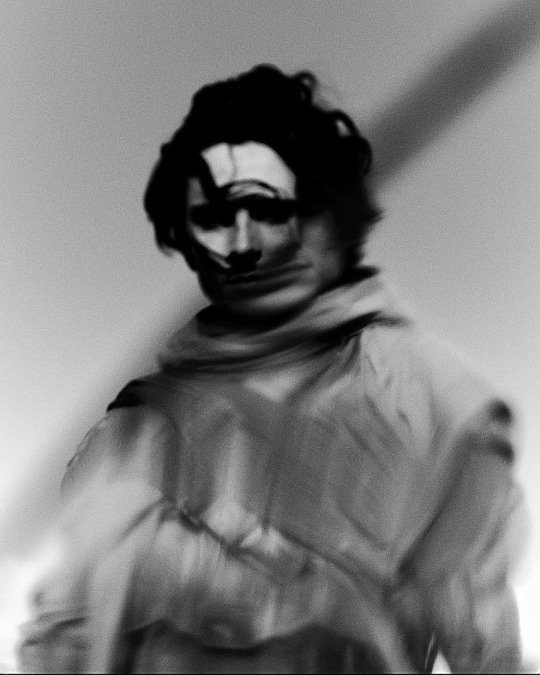
Stunning photo by Jack Davidson
So I didn't think I would be talking about Dune in my first post for this page (considering that I intended it to be more Star Wars focused and also since I haven't read the Dune books yet), but the final stretch of this movie has been on my mind ever since I left the theater a few weeks ago.
(Spoilers for Dune: Part Two)
It's strange in the sense that we are suddenly distanced from Paul, and also in that the climax seems to accelerate the story faster than ever before. So far (in both movies), there has been a pretty strong focus on Paul and a very deliberate pace that let all the plotlines simmer. It’s a masterclass of immersion, both technically and emotionally. The humanity of its characters aren’t lost in the many elements at play. Paul is a character whose empathy and how it makes him conflicted with what is placed before him make him quite likable. Spending so much time with him, Chani, and Stilgar makes us grow attached to them, not just because they’re the heroes, but because they feel real. And yet we’re pushed away. In the third act Paul's dark transformation happens swiftly (you’d initially think from how it’s shown the water of life turns you evil), and by the story’s end we only see Paul from a distance in the eyes of other characters, unable to see him resolving the concerns we’ve wrestled along with him, unable to get a good read on his motivations anymore. The final battles with our heroes happen rather quickly as victory over the Harkonnans and the Emperor comes pretty easily. On one hand this shift could feel unsatisfying, and the first time I watched the movie I was a little unsatisfied. But I’m not here to say this is a fault of the movie; in fact, this shift results in something greater happening, and it’s the most powerful triumph of Part Two’s story.

By the end, even when we do zoom in on Paul we're not sure what's really behind his intensity. (All the Dune screencaps are from Dune Perfect Shots 4K on Twitter).
Dune’s story up until this point, from what I know about these two films at least, is all about complexity, discerning the many variables, the need to carefully monitor both these variables and one's own behavior. The importance of mastering oneself. (This video by Alt Shift X talks about this really well, and it definitely helped me understand this aspect of the story better). But Paul’s tests, like the Gom Jabbar in Part 1 and the worm ride in Part 2, carry not just that significance but also the danger of a prophetic horror being more and more certain. Therein lies an irony - you can gain power but tied to it is something much larger that’s out of your control. This becomes pretty key to the whole story, and there’s something I was reminded of that helped me put all this into perspective. I brought this up in my first-time watch review too, but I think I have more to say about it now. But bare with me as this might end up being convoluted.

In one of my classes this semester we read the poem “The Promised Land” by Gabeba Baderoon, and I was really struck by this image that it alludes to called the Angel of History. Described by Walter Benjamin based on the painting Angelus Novus by Paul Klee, it depicts an angel whose wings get caught in the winds of a destructive storm “blowing from Paradise.” It’s trapped in the storm’s momentum going forwards with no way to escape. All the while, its head is permanently twisted backwards, forced to watch the wreckage of the storm, named progress, gathering below it. From what we discussed in that class this disturbing image suggests that all the events of history, all that we do or achieve or create, is not a series of events affecting each other, but instead one ever-building catastrophe barreling forwards. Both the Bene Gesserit’s century-spanning machinations and Jessica’s usurping of it all by birthing a boy. Whether the Harkonnen house or the Atreides house controls Arrakis. All of these are merely before a future that’s larger than any of them individually; the messiah and his holy war will come regardless. Even if it’s towards her own end rather than that of the Bene Gesserit, Jessica still uses their propaganda to facilitate his rise. The two houses end up converging anyways in their family trees with the Baron, and Muad’dib Atreides embraces it, merging the two families’ ideologies like the Kwizatz Haderach was always intended to. Whether his sudden ruthlessness is him embracing his desire for revenge or actually a strategic choice after sifting through the past and futures laid out, we’re denied of knowing for sure as we look at him from afar, and this denial by the film questions if the answer even matters much. The Angel image and the movie’s narrative dispel the idea that we have the capability to easily fix things when we make progress. It’s a notion that renders reasoning or means as having little ability to empower, envisioning us all moving towards the same horror anyways. It suddenly renders all the complexity of the plot and these competing ideas and factions inconsequential. And I don’t mean that in a bad way — it’s crucial to what the film is really getting at.
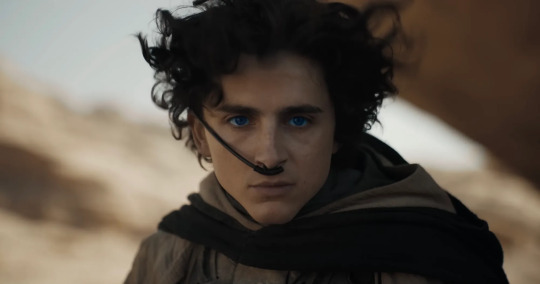
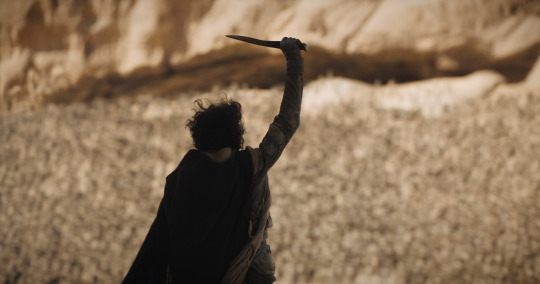
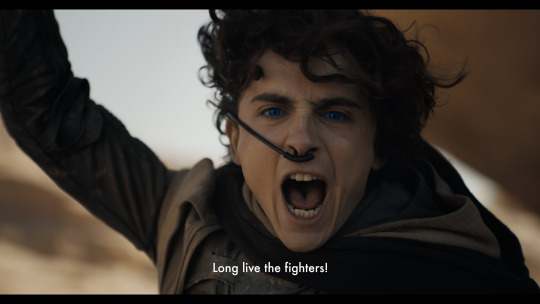
"We're Harkonnens... so that's how we'll survive. By being Harkonnens."

“You of all people should know there are no sides, Reverend Mother.”
Now, it’s fair to question the nihilistic bent of this (are we in the real world truly powerless to stop to this continuous catastrophe???), but the Angel of History and Dune use the stories they put forth as cautionary tales where that all-encompassing bleak endgame are meant to deconstruct our notions of progress and control. If we are powerless to shape history, how strong is the power we wield? And how good is the power we wield? As we strive for “paradise” and celebrate attaining it we often forget what happened as we got there, and we fail to see where we really are. If the reasoning for our actions doesn’t empower us, the effects of them in turn are even more debasing. The Baderoon poem that alludes to the Angel of History does so to examine this too. In its discussion of the end of apartheid and the ushering in of a democratic South Africa, “The Promised Land” weaves in the legacy of the jazz pianist Moses Molekelwa, who, despite influencing the poem’s speaker’s attitudes towards social progress (and appearing as an idol in that sense), is shown as getting off the hook in the eyes of history for strangling his wife to death. The triumph of his music is remembered while his wife’s murder is willfully forgotten, and the poem concludes that “our forgetting is also our home, which is why we will never leave the old country.” Baderoon warns of when the celebration of progress doesn’t factor in the ugly parts we still carry with us into the future, and her allusion to the Angel of History works to convey that danger. (Obviously the real anti-apartheid struggle of South Africa is very very different from the story of Dune, and I wouldn’t want to compare them to each other. Dune’s exploration of complicated progress instead speaks more towards the dangers of charismatic leaders and the co-opting of a cause). The only thing I want to highlight is just that Dune, Baderoon’s poem, and the Angel of History all hone in on the need to not lose sight of the now.


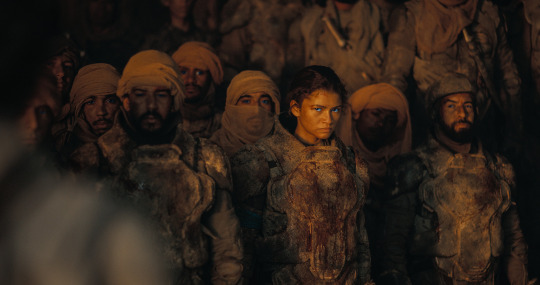
This is why the third act’s shift away from Paul works so well. The film doesn’t show people “forgetting” necessarily, but we do see them caught in the fervor without acknowledging what’s happening to them. Paul is an exception in that he sees it all: his arc sees him changing his perspective on the destiny laid ahead and taking control to ensure it happens on his terms. He doesn’t really turn evil, but since we’re denied of seeing past his new icy exterior as he looks ahead with his prescience, the film instead turns us back to the now, like the angel looking behind. We're with Chani now, the only (non-psychic) person who’s seeing this all. We already believe in Paul’s goodness. If we were to see what Paul sees and fully understand his reasoning, it would make it easy for us to downplay the costs. The story thus has us focus on the consequences of Paul’s path beginning to gather in real time, the Fremen being exploited as they are led into a coming bloodbath by their messiah.
And this is the sadness of it all, right? Things that were once honorable, like Jessica protecting Paul like she promised Leto and the legacy of Leto that Gurney hopes for Paul to carry with him, are twisted into foul and manipulative actions. Good intentions and real connections, like Paul’s empathy, his and Chani’s relationship, and his and Stilgar’s friendship, all give way to the storm.
The quickness of the third act’s events compounds this danger. The path Paul takes may be the best possible option after considering all the variables, but the story doesn’t revel too long in the glory of his successful leadership and strategy.

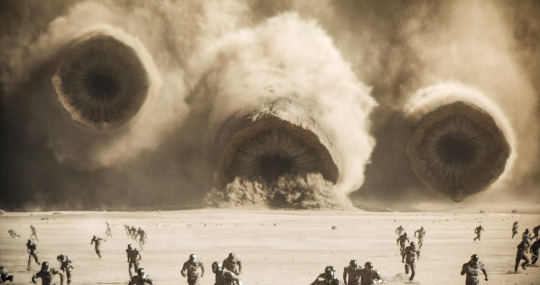
The awe-inspiring images speak not to just heroism but something volatile and intoxicating. It's not that the film oversimplifies the moral dilemmas at stake, but by letting the big battle, Gurney slaying Rabban, and Paul slaying the Baron happen all too easily, it removes the focus from only being the powerful exploits of Paul and the Fremen and adds emphasis on how they become like Harkonnens and how the Fremen become entrenched in Paul’s conquest. The Harkonnen bodies are burned like the Atreides were before them, and the Fremen Fedaykin ultimately fight carrying the Atreides banner instead of their own. They lose sight of this fact as they place all their faith in Paul, their cause and faith co-opted. It happens so fast and it can’t be stopped. We’re caught in the momentum of the storm raging, pushing us forward, and at the same time the film adjusts its focus to ensure that we don’t forget to recognize the consequences of Paul’s choices. This is what I find so compelling about this movie — we’re given a story that details the complexity of all things and also ultimately denies complicated factors and necessary evils of becoming excuses that wave the wreckage of progress away.
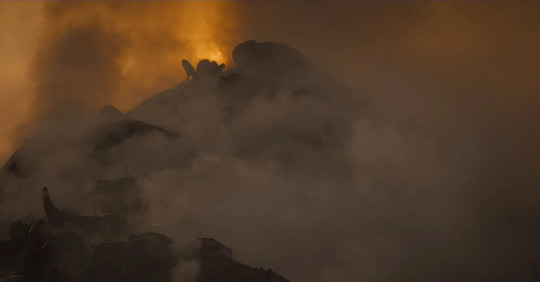
Hopefully this was enjoyable to read and wasn't pretentious or anything! Lemme know what you think about the movie!
#dune#long post#dune part two#dune movie#dune 2#dune part 2#dune 2024#paul atreides#kwisatz haderach#lisan al gaib#angelus novus#angel of history#determinism#frank herbert#denis villeneuve#gabeba baderoon#movies#movie review#movie discussion#movie analysis#film#film analysis#film discussion#media analysis#favorite movies#letterboxd#cinema#movie stills#movie photography#movie adaptation
10 notes
·
View notes
Text
thoughts on priory of the orange tree (minor structural spoilers)
i liked the first 3/4s of this book a lot more than the final stretch. the book builds its world from familiar fantasy tropes remixed in fun ways and then subverted in even more interesting ways. the basic structure of the book, alternating its narrative between east and west, with 4 PoV characters, lends the story a good rhythm, at least after the first couple chapters where it feels like reading four different first chapters in a row. but all 4 pov characters felt distinct and powerfully realized and I enjoyed my time with all of them.
for a fantasy book I felt like it all felt a bit un-magical. by about halfway through the book has explained the rules of its world, the types of magic and how they work and who can use them, and it cleaves totally to those rules until the end. its just a bit "magic is when you shoot fire out of your hands" for me. doesn't spoil the book or anything but its not my preference. like if you can explain it then its not really magic is my feeling.
my biggest gripe is that there's a point towards the end where all the conflict seems to go totally out of the book. like once all the mysteries are solved and the protagonists have the full picture, they make their plan to win the day, and then the last 20% of the book is just them doing that with very few hiccups.
okay i think i'm being too harsh. they definitely still encounter difficulties on their way to it but the plan they execute is exactly the plan they made. that just feels a bit anti-climactic to me? like the book just tells you how its going to end about 100 pages before the end. and then it does end that way. there's a lack of tension. feels like either something should have gone wrong, or they realize they've misunderstood some fundamental aspect of things and need a new plan.
like it's very much a book about Realizing Things, which is exactly what I loved about it. its about the conflicting beliefs of various cultures and the way ideology distorts history, etc. the big mystery of the book is "What is the real history of this world?" but that mystery is solved about 80% of the way through, and we're left with a big battle scene that doesn't meaningfully engage with the question. just needed one more fundamental shift in understanding right at the end I thought. honestly I was convinced the book was setting us up for that too, but then it just doesn't happen.
in general the ending feels a bit rushed. i dont mind the pacing picking up for the climax of a story but the earlier chapters are so vivid and lush with detail, and then at a certain point we just stop learning new things, so it ends up feeling like just a list of things that happen, idk.
anyway endings are hard, and it's ultimately a pretty small part of a very long book, and the sense that there is some enduring mystery does set it up well for a sequel, which I'd be eager to read. apparently there's a prequel book, which I think I would read if I knew a true sequel was coming, but might not get around to otherwise.
i always sound so negative when i book post but I genuinely liked this book.
last few thoughts uhhh. the book has this really amusing tendency to just kill characters as soon as its done with them. not a criticism except in the instance of (minor spoilers) Tané's friend who got sent to feather island. that one felt odd in that it really seemed like Tané was being set up to meet her there and maybe learn something about how she viewed people (and herself) growing up but then oops! she's actually already dead when we get there.
the romance was very good.
shout out to Roslain I just think she's a great character and she gets one of the best lines in the whole story
also I wish we'd gotten more Tané but apparently the author agrees on that point lol. dragon-hearted girl you mean everything to me
5 notes
·
View notes
Text
a place between unreality and lucidity, or understanding the intentions of Chapter 12
CONTENT WARNING: DISCUSSIONS OF DEATH, SUICIDE, AND ABUSE. I ALSO TALK A LOT ABOUT LUCID DREAMING, WHICH CAN BE DISSOCIATIVE FOR READERS, SO PLEASE TAKE CARE OF YOURSELF.
SPOILER WARNING: REFERENCED YUME NIKKI AND OMORI SPOILERS, AND OBVIOUSLY, DREAMSCAPE SPOILERS.
We're back bois, and we're back with my favourite chapter.
I love Chapter 12 so much, the same way I adore the Truth Sequence in Omori. Originally I was going to compare the two, but I realised there's little overlap other than the intentions they're written with.
...so I wrote about the intentions instead. The little bitch boy intentions. You'll see what I mean.
Buckle up, this one takes some insane turns. I had wild epiphanies while churning all this out in a couple hours. I think I may be losing my mind.
understanding what I mean by "lucidity", and discussing dreams as plot devices
Lucidity is a very particular type of plot device that I find difficult to describe - it is a specific type of fragmented narrative that fragments location, exploring an impossibility that often has links to deeper meaning. Typically it is an abstract way of foreshadowing or revealing something to the reader, and it mirrors the concept of a "liminal space".
Dreams in texts have been used as a method of foreshadowing for hundreds of years. While the human brain has no ability to predict the future, but only reframe the past, the uncontrollable fragments of memory that are spat back out at you during unconsciousness have captured human fascination since we first started sleeping.
Dreamscape itself isn't a dream, but it is a different form of consciousness, and the creator has stated that Chapter 12 draws a lot from lucid dreaming, which suggests this counts as part of the 'Lucidity' narrative trope. As someone who does not dream much, I find this shit fascinating. Like I'm sure it's horrific as hell but. It seems so fucking cool.
Perhaps some of the best examples of the use of lucid dreaming to form narrative are Yume Nikki and its fangames, as well as Omori. Yume Nikki was a catalyst for the creation of many RPG maker horror games, and it's an excellent piece of work. No concrete story, just wandering an endless abyss of Madotsuki's mind, observing the horrors within it. The fangames branched off this concept (I personally recommend .flow ) and added more aspects, but never being concrete about the trauma.
Things are illogical in the Yume Nikki dreamverse, but they don't have to be logical, and things don't have to make sense to the player - it is purely up for speculation. At the same time, we know it has to mean something. There's an innate sense of exploration and meaning in dreams, despite the real life version often being meaningless bullshit.
This is where Omori explicitly diverts - it outright states what happened on the Recital day, in a short, distorted sequence known ominously as "The Truth". While the entire game is about lucid dreaming, this section captures the horror due to the illogical nature of it, where Sunny travels from his living room, to a hospital, to stairs, his bedroom, backstage... things are wrong. At the same time, the player is focused on completing the album and collecting the polaroids, with the confusing nature of the locations building to the horror of the final moment.
Despite all this, none of these sequences are the big moment, or even nearing the climax.
Yume Nikki doesn't have a big moment, unless you see the ending as significant enough for that title. It is a game about wandering unreality, and without a plot, it can't have a climax. It uses lucidity to provide a sense of narrative, even when there isn't one, tricking the player into trying to comprehend an impossible universe.
Omori is not building up to that that one sequence, but rather, it is a stepping stone leading to the Final Duet, which is the true climax of the game. It's an emotional release for Sunny and the player, a sense of finality in a game without a proper "ending". The Truth sequence is merely a way for the player to understand plot and build horror, and without the Truth's photo album... we would understand nothing at all. An impossible universe.
This leads to my big theory...
the purpose of chapter 12 - you can't understand it
Chapter 12 is a lying piece of shit and won't admit to us more than cookie crumbs about the future of the Dreamscape universe. And I still love it. And here's why.
Due to the abstract nature of it, we can't understand it. Perhaps Sunny can, to some extent, but since we're not sure the cause nor purpose for it, we can't understand it. We can speculate, but we can't understand. Just like Yume Nikki, we might never properly understand what each segment means.
Here's some little nuggets I've been scrambling through for information.
The beginning talks about time and distortion of it, which mimics some of the issues with time Sunny has in real life. This may be foreshadowing his eviction or declining physical state.
Body horror is incredibly prevalent, particularly self-mutilation. This has several implications, but it likely hints to Sunny's feelings for himself. It may also foreshadow what Mari looked like during the Recital day scene, which I'm starting to realise hasn't actually been shown yet. Interesting.
While this is one of the first times we see Mari as more than a virus or a corpse in the text, it's also completely distorted by Sunny's unreliable narration. Despite the slightly manipulative conversation held between them, Sunny is completely frozen in grief, desperate to beg for her forgiveness.
Sunny sits there with her pain in that hospital, insisting he deserves it. It hints further to Sunny's declining mental state, but that doesn't tell us anything more than his own self-loathing. Both this and the above point foreshadow Mari's potentially abusive nature.
Sunny is completely determined to stay within the lucid dream, and is also very insistent that Mari is somewhere at the end, which turns out to be right. How he knows this is not shown to the reader.
Segments of this are related to Mari's own memory, which provides us with a better understand of the VHS system, and of the accident that lead to her suicide.
The lucid dream is a representation of Sunny's unending trauma through what he perceives to be Mari's eyes, perhaps even a representation of what he feels he needs to do for her forgiveness.
We also learn a bit more about Pianoboy, who we know is a clone of Sunny, and he specifically highlights a connected feeling of isolation. At the same time, it has to go further than that, but we're again limited by understanding. There's more, but not enough to guess what 'more' means.
But those tidbits mean nothing. And I can't do much more than spew nonsense about segments, with no ultimate conclusion.
Because Chapter 12 is not designed to be understood, but rather, it's something to look back on when you finally do understand. It's foreshadowing in its most complex form, hinting ominously to what you don't understand. It is also similar to Black Space in this way - no-one can figure out the truth of the Recital Day from Black Space alone.
I could spend hours trying to understand every symbol, every room, the essence of Chapter 12 itself, and fuck me because i totally would but ultimately, it's all fragments of a deeper narrative, more complex than our limited understanding.
And it's a horrible, horrible thing to do to a reader. An unanswerable segment, dangling understanding right in front of their nose, but making it unreachable. Haunting them with the human desire to see patterns in chaos. What utter cruelty. How could you do this to me, @omoriboii. Why would you do this to me, the analysis God, with the most overthink-y brain in existence, and yet give me, ultimately, nothing to lead to. Why leave me a crumb to look back on, something I can never understand with the information I hold. I may be stupid, but I can understand when I am beat.
It's perfection.
why even torture someone with the inability to understand?
Building horror is incredibly difficult, because it's so easy to do foreshadowing incredibly wrong. We've all seen horror movies that are so bad they're funny, relying entirely on petty jumpscares, terrible props and showing off the killer way too fast-
Wait a minute. Showing off the killer too fast ruins everything? Dammit, I wanted to flex my big sharp knife. That's right guys. I'm the serial killer of this blog. ?????
Anyway, demonstrating the inability to understand something to the reader is a common feeling that gets the emotional brain hooked and the cogs whirring in the logical segments. You need to understand. You develop theories, you discuss them with others, seeking evidence, only to find something that changes your view, ruining everything, forcing you to start again. Being teased is fun. I am kinky
That's my favourite feeling of all time. It's why I spent hours searching for that again after I played Omori. I still remember my first theories of the truth of the game, right up until the one I had just before I discovered the real Truth. Even after that, there was more for me to analyse. Analysis. I love analysis. Yk?
I love a good challenge, and analysing these segments are so much of a challenge that I actually can't do it, which is why I get so hyped over it. Why do I do this to myself?
I actually don't really know how to end this, but I think you get my point. It's fun. I like it. I love suffering. uhh. dreams cool.
new bit: song i wrote this listening to.
today's song, the main title theme from Tomorrow Won't Come for those without.
youtube
i needed a reminder of what horrible liminality feels like, and that goddamn game does it better than anyone. i love it so much. thanks, etherane, your games cursed me with a sick desire for unreality.
special thanks to all the games who ever bullied me for having boring ass dreams.
#i wrote all this on copious amounts of caffeine#dreamscape au#omori dreamscape au#omori au#dreamscape#lucid dreams#sentience's stuff#i'm such a nightmare in this LMAOOO#i've written my own little chapter 12 lucidity within my analysis of chapter 12#what have i become#omori fanfic#im a fucking mess#i think i lost my mind here#Youtube
13 notes
·
View notes